#welsh wedding laws
Explore tagged Tumblr posts
Text
HI me again back with another Welsh law bonanza. For some reason I don't know, u guys really liked the Gwenhwyfar divorce post I did a few weeks back, so allow me to shed some light on how divorces worked as well as marriage payments, and the role of a queen in Welsh law. (Which doesn't have much on it but is FASCINATING.)
Also, I am SUFFERING from cramps so I apologise if I ramble.
First off, Marriage Laws.
So, as previously discussed there were two ways a woman could marry: she could either be given by her family, or she could elope. Now, a woman who eloped would still be entitled to the same monetary payments as a woman who was given in marriage by her kin,
So, the Dues Payable are as follows: Amobyr, Cowyll, Agweddi, Gwaddol, Argyrfreu, and Wynebwerth.
I'm gonna cover Amobyr and Cowyll today, as well as do a lil write-up about Queenship so yeah.
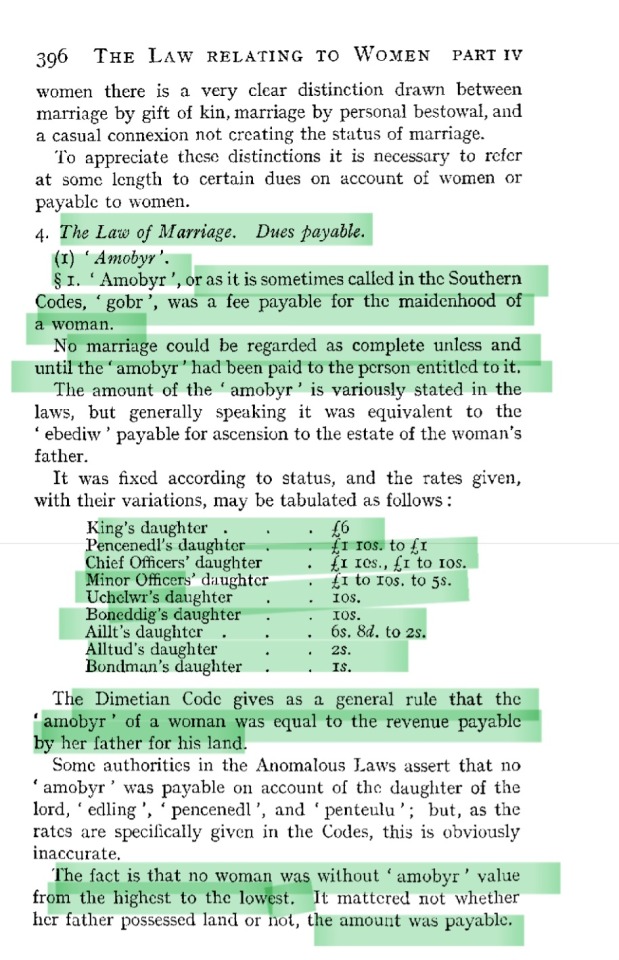
It's a maiden fee! Now, this and the Cowyll are BOTH maiden fees, however, they differ as Cowyll - and we'll get onto it later - is a fee maybe to the lady herself. Sort of a wedding morning gift, I guess. 'Sorry I slept with u, or not, have some money.' Which, is extremely crass.
The Amobyr was fixed to a lady's status and it goes from King, Chief Bard or Storyteller, Chief Officers (so a Distain, which is what we Welsh would call a Seneschal), Minor Officer's daughters, Uchelwyr (so knights or lords), and then your middling noblemen, to peasants, foreigners, and slaves.
It's essentially equal to the revenue the father would get for his land, but EVERY SINGLE WOMAN would get it, regardless of status. High-born or low. The amount's payable regardless of whether you have one penny or seven thousand.
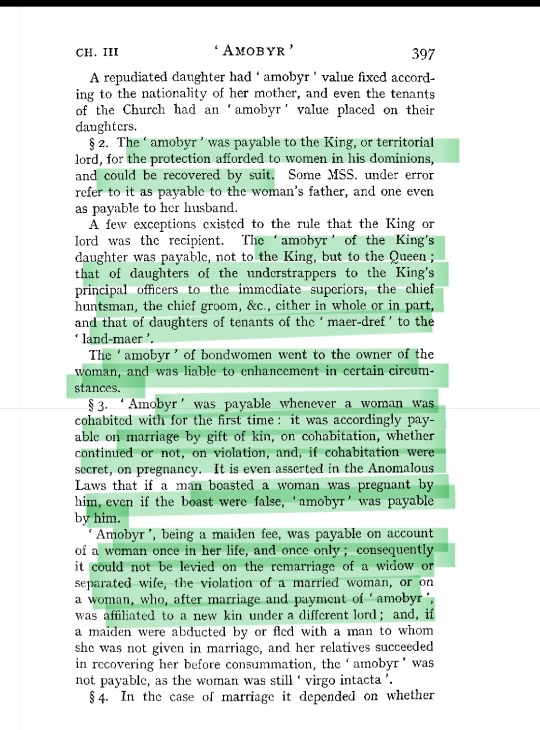
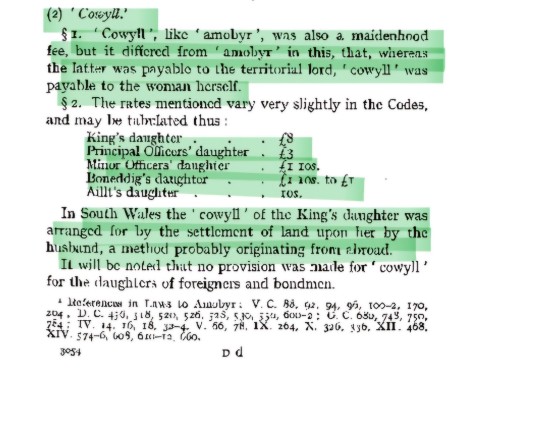
Now, amobyr could be recovered by suit as it was payable to the King and was essentially like protection money. If you made off with somebody's amobyr you were in BIG TROUBLE. HOWEVER, and I really love this fact, the King's daughter's amobyr would be payable not to him BUT TO THE QUEEN, as well as other daughters of high rank like your Pencerddau, chief groom, etc.
Amobyr was payable once a couple had cohabited for the first time, and even had to be payable if a man boasted that he'd shagged a woman and gotten her pregnant, but actually hadn't. Presumably because a) these laws are BIG on honour bonds and things and because you'd lied you'd tarnished that woman's honour and your own, and b) you'd kinda claimed that Lady as yours because you've made her unchaste.
Because it's a maiden fee it - like the Cowyll ' could only be paid ONCE. No more, no less. If you were a widow or wanted remarry, you can't get the amobyr again. Also, if you'd eloped with a dude and your family had caught you before you'd consummated your relationship they didn't have to pay cuz you're still a virgin. Also, if you were raped then the rapist had to pay amobyr to your family in recognition of that.
Finally, a lady who'd had a fling which had resulted in a bastard child* but she hadn't declared who the father was, then she was responsible for the amobyr. However, if she HAD declared who the father was then he had to pay the amobyr instead.
The Cowyll, as I've already said, is a personal payment to the lady that's made on the first morning after marriage.

Now, in North Wales it's always given as money even if you're a King's daughter, BUT if you're in the South then you get la lovely chunk of land. So if you married a prince of Gwynedd, bad luck, just money for u. If you married a Prince of Deheubarth then you are QUIDS IN! (THAT'S YOURS FOR LIFE BABYYYYY)
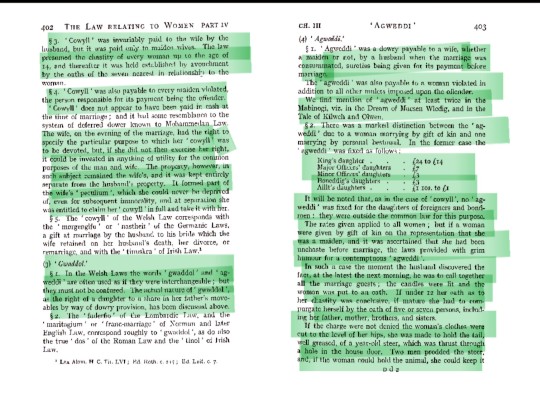
(Ignore the Agweddi for today. Or don't. Think of it as a tantalising glimpse into the next law I'm gonna cover.)
Cowyll is both paid to just married women AND those who were violated against their will. The wife / lady who had been violated had the right to specify what they wished for their cowyll to be in service of. If she didn't then it just went on stuff for the couple, so I'd imagine whatever the medieval equivalent of IKEA flat pack furniture would've been, that would've been what they'd have chosen.
Also, it's kept entirely separate from the husband's property so he Could Not pinch from it, or use it in service of himself. You couldn't even be deprived of it if you'd had an affair or did any naughty business. That's YOUR MONEY AND BY GOD YOU CAN KEEP IT. Even if you divorced your husband or he you, you would be allowed take your cowyll with you.
Now, finally, QUEENSHIP.
(Particularly handy if you are, like me, doing an Arthurian-inspired, Welsh-set novel and you GOTTA KNOW WHAT GUINEVERE DOES.)
There is not a lot on it because it isn't something that's studied that much (idk why. Wales has tonnes of cool Queens even if they didn't become regent) but we make do with what we can!
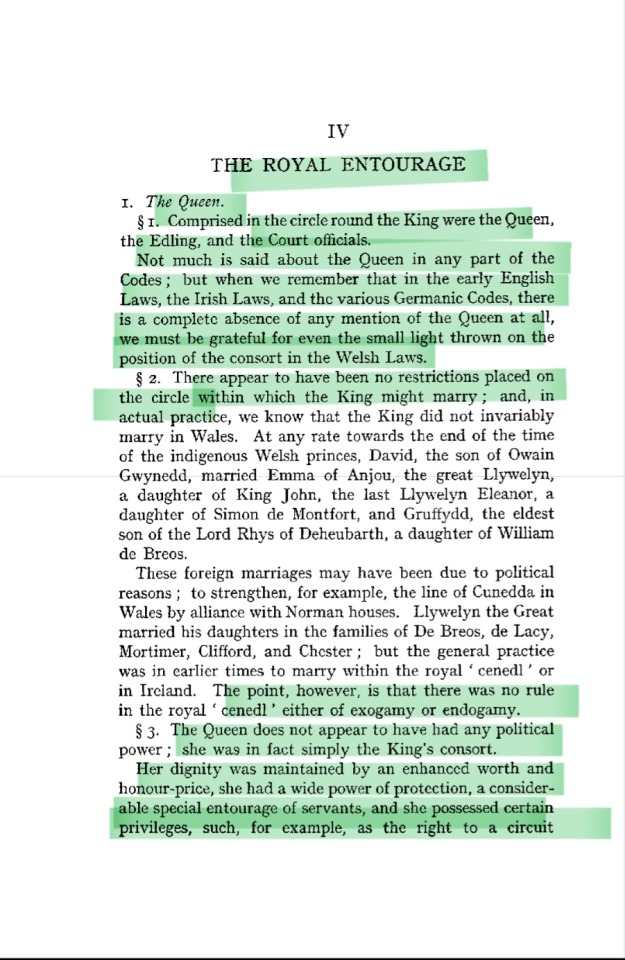
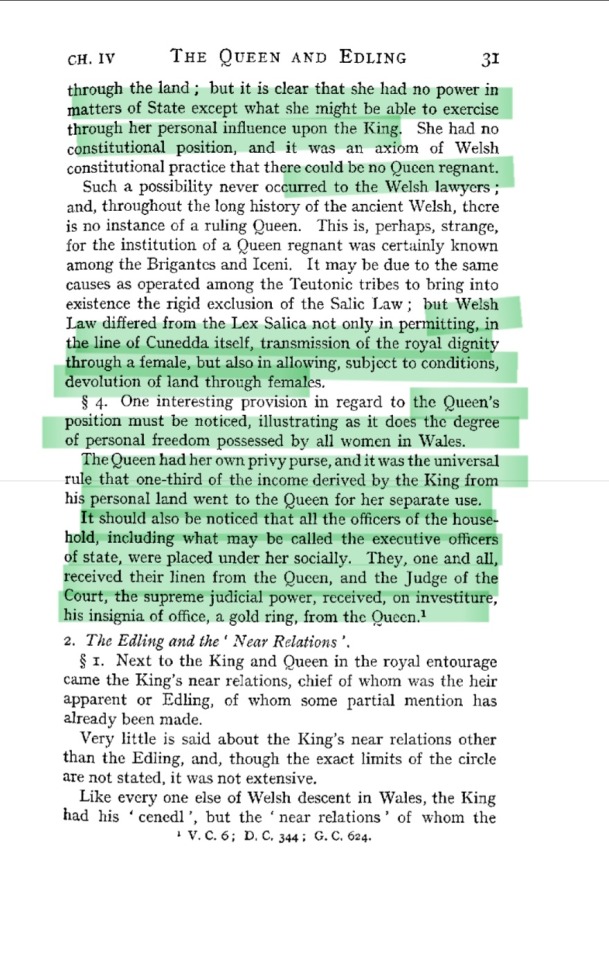
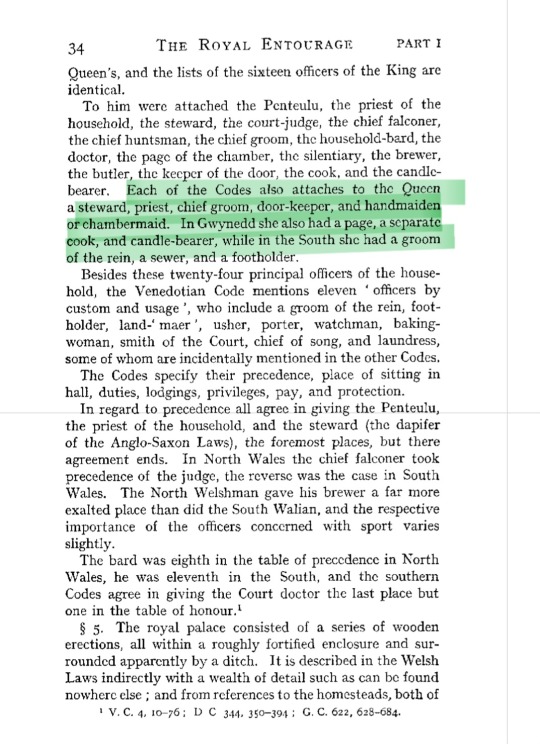
You, as King, could marry ANYBODY (Within reason, nobody is marrying a peasant girl) within what would be termed your Cenedl (that's your family.) or out of it.
Kings, we know, often married their first cousins, or second cousins to keep the balance of power within Wales (you gotta remember Wales wasn't united back then! Gwynedd, Powys, and Deheubarth fuckin squabbled like dogs over bones, and Do Not get me started on the littler kingdoms like Arwystli or Senghenydd.)
Seriously, Gwenllian ap Gruffudd ap Cynan (Gwynedd) eloped with Gruffydd ap Rhys (Deheubarth) and they were like distantly related. Or, Gwenllian's brother and v famous boi, Owain Gwynedd married his first cousin, Cristina (and, in doing so, ensured that after his death Gwynedd would have a power vacuum because of squabbling that wouldn't be sorted until Llywelyn Fawr took the throne and overthrew his uncles. It's always fuckin Gwynedd. Even Gwenllian's son, The Lord Rhys, married one of his first cousins, who was also named Gwenllian.)
*Gets slapped with a wet fish* Sorry, I was rambling.
Now, kings did also marry for political alliances. Gruffudd ap Cynan himself married Angharad ferch Owain (can u sense a theme with the names?) because she was from a well-off, noble family who had ties to the Anglo-Saxons when Gwynedd was in a bad spot with the Norman's. Llywelyn Fawr married Joan, the illegitimate daughter of King John of England, when relations became... tense, shall we say.
So, lemme go over some stuff regarding laws real quick before I tell u why I've highlighted these three ladies. (Cuz they're fun and I'm in love with them- uh, you what?)
So all the Codes (North, South, Mid) attach the following to the Queen: a steward, priest, chief groom, door-keeper, and a handmaiden. In Gwynedd she was also given a page, a separate cook (presumably because of poisoning attempts), and a candle-bearer (would LOVE to be that. No joke.) Whereas in Deheubarth she was given a groom of the rein, a sewer, and a footholder. (For all u lovers of the Fourth Branch of the Mabinogi out there this is a win for u.)
The line of Cunedda which (and, fuck me, I can't believe I'm saying this) IS BASICALLY ALL OF THE KINGDOMS OF WALES allowed for transition of royal dignity through a the female as well as the male. That means u could contest ur throne using your mam's blood and status as well as your dad's. Owain Glyndŵr, as I have previously mentioned, did this when he started his rebellion against Henry IV, as his mother descended from both the houses of Gwynedd and Deheubarth and his father descended from Powys. Truly, the people's Prince.
Now, a queen had her own privy purse (Go her), and one-third of the income the king received went to the Queen for her personal use. She also received land grants that went directly to her.
Now, finally, why tf did I highlight those three Queens that I spoke about earlier? Okay, so, Queens couldn't be regents, BUT they absolutely could and did use their power in any way they could.
Angharad ferch Owain was the mother of Owain Gwynedd, Gwenllian, and Cadwaladr. Owain Gwynedd ruled Gwynedd after his dad died in 1137 and led Gwynedd to become Wales' most successful kingdom at that time. He is also the reason why the Prince of Wales is called the Prince of Wales. ANYWAY. He and Cadwaladr had a falling out in 1143 and Angharad, not liking the way Cadwaladr was being treated, took his side. (Dunno why, he killed her step-grandson, Anarawd. Like, Angharad pls. Priorities, del.)
So, Owain ordered his son, Hywel, (yes him of bardic fame) to BURN DOWN Cadwaladr's castle in Aberystwyth. Cadwaladr, enraged, hot-footed it to Ireland where he and the Vikings invaded Gwynedd in an attempt to make Owain give him his lands back.
Angharad supported Cadwaladr by allowing him to beach his forces in her lands of Abermenai in Ynys Môn (Anglesey.) and also tried to intercede on her son's behalf with his brother. Anyways, the brothers were reconciled (for a brief period. Cadwaladr was aligned with the Normans so he remained a thorn in his big bro's side.) and Angharad lived until 1162. Her death led Owain Gwynedd into a melancholic spell.
Gwenllian ferch Gruffudd ap Cynan waged war against the Normans during the Great Revolt. Fighting against the Normans was very much a family affair for, you see, her brothers Owain (previously mentioned cousin-marrier) and Cadwaladr also waged war against the Normans at this time, and their dad, Gruffudd ap Cynan also fought against them SO HE COULD BECOME KING OF GWYNEDD. After her husband left Deheubarth to go and plead with her father for troops and aid men flocked to her and they waged a guerrilla war against the Normans until 1136.
This pains me to say but a Welsh lord betrayed Gwenllian after the Normans - seeking to win back the territory that Gwenllian and Gruffydd ap Rhys had recovered - waged war against them. She and her two eldest sons, Morgan, and Maelgwn died. Morgan in battle, and Maelgwn and Gwenllian were beheaded at Castell Cydweli.
After her death, South Wales rose in rebellion against the Normans. Her brothers, once word reached Gwynedd, invaded Norman-controlled Ceredigion (which was Deheubarth's territory.) and won back Aberystwyth, Llanfihangel, and Llanbadarn. The Welsh battle cry for many years was 'Dial Achos Gwenllian!' Revenge for Gwenllian.
Finally, Joan, Lady of Wales. She's referred to as Siwan in Welsh. She was the daughter of King John (as previously said.) She often mediated between her father and her husband, Llywelyn Fawr. The Brut y Tywysogion writes: 'Llywelyn, being unable to suffer the king's rage, sent his wife, the king's daughter, to him, by the counsel of his leading men, to seek to make peace with the king on whatever terms he could.' I'll probably do a full post about her at some point but yeah, she's cool!
Anyways, hope u enjoyed this!
Okay, hywl fawr!
#the laws of hywel dda#welsh laws#wales#cymru#arthuriana#sort of#joan lady of wales#angharad ferch owain#gwenllian ferch gruffudd ap cynan#welsh history#hanes gymraeg#arthurian mythology#welsh marriage laws#queenship#is this useful to the arthuriana crowd?#welsh monarchy#the house of aberffraw#welsh mythology#welsh stuff#it me#my writing#arthurian legend#welsh wedding laws#celtic laws#mabinogion#the mabinogion#queen guinevere#historical research#welsh queenship
47 notes
·
View notes
Text
The Hound
So @the-kingshound updated and I dove headfirst into feelings and needed to get some feelings out...So I wrote a thing. As you do. A bit terrified to post outside of anon, but...2.5k words is too much for an ask and the discord...so...here we are.
Some moderate CW though, it contains depression, sexism (I know most people aren't going to want to delve into this sort of stuff because it's escapism, but I find it cathartic and validating when it's at least acknowledged how shitty it is to have a uterus at any point in time), and my Hound is not the nicest person around. (Arthur please don't give up on her, she'll get there)
OH and a part is inspired by a really old poll Kal asked about what color we'd like our dog-hounds to be and I know everyone went with the Christian Black Hound of Hell cause it IS iconic and spooky, but I was going...but a white hound would mean something to the Welsh. It makes a statement. SO I added it in the end to soften the angst.
Enjoy below the cut because I have no chill.
Guinevere stared across her small table at the King. Her husband, she supposed, though in the eyes of the court the title was not official. He seemed unable to meet her bright red eyes—not uncommon in her experience. Even in her own House people struggled to hold her gaze. More than once had she overheard whispers of the unsettling otherworldly heir, the one that must’ve been taken by some spirit or another.
Here was no different, only the terms changed. Annwn, Arawn, Mallt-y-Nos all were whispered as she walked past instead of Da Derga. ‘Bad omen that one’ was still the same though. ‘It’ll be the death of the Pendragons, letting one such as her share a bed with the King,’ in some form or another.
She waited patiently, stoically for the King to sort through whatever went on in his head. She refused to let her gaze leave him. To show any sign of weakness lest he go for her throat so to speak. She watched him as any prisoner might when face to face with their judge and executioner.
Arthur, as a person, was not…terrible. Though the most she saw of him was at their wedding, to be fair. Her hackles bristled at even the memory of the word. Wedding. It was nothing more than a celebration of her family’s downfall. The handfasting, nothing more than a shackle, a collar to show the might of Camelot.
But it was not yet a total victory.
After all, there were still more humiliations the king could bring against House Venegard. One, in particular, she dreaded more than others. She understood her duty, of course, and she would bear the torment like the cliffs do the raging sea…
That did not mean her stomach did not cramp. That bile did not coat her tongue. Her fists clenched in her lap, waiting those dreadful words, the terrible command. Her throat tightened against the rising emotions. Her skin prickled.
‘It won’t come to that,’ Saraah had told her. Radel and Ghaven had tried to comfort her as well. In their own way. Ghaven told her to use their wedding present on Arthur if he tried. It…it did make her laugh despite the crushing despair. Saraah had tried to tell her she’d be safe, that they doubted Arthur would force her to do anything.
She loved her siblings, but…she also knew they didn’t understand, not truly. They were, in the judging eyes of the law, men. They had the rights to their wives—not including Saarah of course.
They did not get the lectures from their mother about how to cut one’s own throat or womanhood should they ever be captured. They did not hear old wives tell horror stories of their first nights. They were not told tricks to get through it, how to fix themselves afterwards because their husband would just leave them once he was through—or fall asleep. They did not hope to die with the birth of their firstborn so they did not have to suffer anymore violations.
After all, what could be more symbolic of the King’s victory than breaking her in their marriage bed as his father did his mother so long ago?
Guinevere bit her tongue to keep her numbness in place. Pain forced her back into the hardened warrior her House had demanded she become. She remembered her mother telling her to never let any man see her scared, see her cry, and she refused to disappoint her.
Arthur cleared his throat. He straightened in his seat. He tried his best to look calm, but there was…some kind of nervous energy. He picked at his fingers out of reflex. His mouth opened and closed a few times. “I wished to ask you something,” he started carefully.
Her stomach twisted sharply. The slight dizziness that plagued her since her betrothal sent sparks over her eyes. She could already understand where this was no doubt going. The court had been rather loud as of late, crying that the marriage was not true. She was only surprised they didn’t demand the King show them the bedsheets afterwards.
She signed without feeling, as always, “Come to take your dues, then?”
Arthur blinked, reminding her of a puppy. “Beg pardon?”
She shrugged, each motion empty of any semblance of emotion. “I’m surprised they’ve let you wait this long. They seem quite eager for you to show me my place.” Her eyes drifted around the room. She noted the places she stashed weapons…assuming Gwyar hadn’t moved them again. They seemed exasperated every time they found a new hiding place…but they also didn’t take the weapons either.
“That’s not what I…” Arthur shook their head, as though trying to shake the thoughts into line. “I’m not—”
“So, a mistress then, that’s to be my humiliation,” Guinevere nodded to herself. “Probably for the best.” Her fingers gently traced the horrific scar across her neck, hidden by her bodice. “Wouldn’t wish to sully the Pendragon line with a wraith.” It was a stark reminder he did not wed a delicate flower, she fought and bled against him. One of his people nearly took her head off.
And the sick part was…she wished they had.
She shook her head against the darkness creeping up her spine. She figured out long ago she would never be a beautiful maiden; she would not be swept off her feet, or whatever Saarah’s fantasies were. She didn’t know why it still stung at this point.
She slowly rose from her seat. The fabric of her dress pulled and tugged uncomfortably against her movements. The neckline rubbed and scratched at the scar. Almost like feeling the rough, chipped edge of the sword again.
Her fingers were cold against her neck. She put them between her skin and the stupid Camelotian garment. Gwyar had convinced her it might be wise to attempt to acclimate to…here. Apparently, some of the court were scandalized by her tattoos. They apparently made her petite-self intimidating, like a barbarian. Or some other drivel.
Maybe they just didn’t want to admit her eyes scared them. Or maybe they were just trying to test to see if the King’s new dog would bite.
She plucked the letters from the table. The seal she was beginning to recognize as Saraah’s glared up at her in accusation. She assumed the others were from various other siblings he had corralled into sending to her. Probably sometime after the fifth letter she didn’t reply to.
She blew out a breath before placing them with the growing pile on her desk. Weight pulled at her bones. The old habit of talking to Saraah begged for her to try. Her chest hurt at the pain she must be causing them.
She drifted away before she could crumble. She had already broken in front of them; she would not do it again. She was the seventh heir of House Venegard. It was time she acted like it. Her feet took her to the window as they often did. Not to stare out over her new domain, but to the sky where birds played with the clouds.
A chair scraped over the floor. Perhaps the King grew tired of her. Or, more likely, he had other arrangements. Spending time with prisoners was hardly worth his time, but still nice of him to stop by, she supposed.
“I wanted to ask how you are,” Arthur’s voice disrupted her quiet contemplation of a flock of birds. She looked to the side as if she could see him behind her. Her back tensed. “We haven’t been able to speak since…” He didn’t say the words as she wrapped her arms around herself. “Your brother asked after you, well his husband asked, but on his behalf, I’m sure.”
Slowly, she turned, smoothing her face against anything that might show the crushing weight on her heart. “I am fine.”
Arthur narrowed his eyes at the simple answer. He kept quiet as he observed her carefully, as if he could pull answers from her like a sword from a stone. “If there is something I can do to make you more comfortable…”
“You cannot.” Her hands moved like swords, cutting off the line of questioning. “As I told Morien and Gwyar, I will remain living.”
Any more than that, she could not guarantee. She would pretend she was collared and leashed, sit when told, rollover as necessary, endure whatever she had to keep House Venegard alive. She would hide what and who she was, bury it so deep down it would crush her very soul into nothingness.
The two of them engaged in a strange staring contest. Her rubies as lifeless as the gems themselves against his captured-skies bright and beckoning freedom. He tapped a finger against the table. She could see him thinking and sorting through the thoughts, or perhaps he was trying to sift through the dense mist of her façade.
“Would you accompany me this afternoon?” he asked suddenly. “I was going to take Mordred, and I know we would both delight in your company as well.”
*****
Why she went was a mystery even to her. Perhaps it was strategic? To be seen with her husband and…stepchild? Show they did have some sort of relationship to keep the nobles at least somewhat complacent.
Maybe she just had a weakness for the child. Or was curious about the destination. Maybe after weeks drifting alone inside her rooms, only venturing out in the mornings to the dead training grounds or for mandatory appearances, she was going mad.
Arthur was pleased with themselves. They had a soft smile and a spring in their step as they escorted the group to a building. A kennel if the baying of hounds told her anything. Mordred’s hand tugged on their sleeve, eyes wide in either excitement or question. Arthur smiled wider. “Yes, they sent word this morning.”
And with those cryptic words, he pushed open the door and gestured for Mordred to go through. The child hesitated, but whatever was beyond the door drew them forward just the same. Arthur turned his smile to her, holding the door for her.
Guinevere eyed him oddly as she passed—well as best she could without pulling her neck muscles. She ignored the softest brush of warmth coming off him, reminding her how cold she always felt. She looked around the humble abode instead.
It did not take long for her eyes to find Mordred…being swarmed by wriggly, wobbly puppies. The mother hound watched over her litter like a queen, but didn’t appear to mind them entering her space. Her tail wagged as Arthur stepped inside behind Guinevere.
She blinked at the one, two, three…six puppies all bounding around on their tiny legs. Two were gnawing on each other’s legs, while a third played with one’s ear. One was pulling at Mordred’s tunic. Another was getting scooped by the child.
A bit of ice inside her chest cracked. It sizzled and popped at the scene. She turned to look up at Arthur. “Puppies?” she signed in confusion. “You brought me to see puppies?”
Arthur smiled. “Yes? They are cute and these ones the houndmaster said were old enough for a visit now.” He shrugged, though the way his eyes moved over the scene made her think he was up to something.
Of course, she always thought he was up to something, she supposed. Still…unless he was going to order the bitch to tear out her throat for good this time…what harm could puppies do?
“I was once told the Irish have great reverence for their hounds,” he eyed her, “even going so far as to give their great warriors and kings the epithet ‘hound’.”
She blinked at him, the nod almost involuntary. Why did he care to know that? Why bring it up? Her chest felt…twitchy under all the ice and darkness. She gave him a probing stare, trying to find answers. “Cú,” she spelled carefully, “it shows they are worthy of the loyalty hounds give.”
“I find it rather…beautiful to think a king is only worthy of his title if he is worthy of his hound first.” He smiled again, before motioning towards the puppies.
Ignoring the strange…prickle in her chest that his cryptic words seemed to conjure, she approached carefully, keeping an eye on the mother before gathering her dress to sit on the ground. The unoccupied puppy plodded its way towards her. It gave a little whine, perhaps a practice growl, before sniffing her. It was black like its mother with wavy fur.
Still, her chest clenched tightly. She made little tongue clicks at the puppies. Her hands petted the brave one that came up to her first. It wobbled and fell to the side. Her mouth parted in a soft laugh, more audible puffs of air than anything. Tiny teeth gnawed at her fingers as she tickled the soft belly.
When the puppy had its fill of her play, it tottered off to a group that gathered near Arthur. For a moment, their eyes met. Bloody red and heavenly blue. A strange pang struck Guinevere’s chest like a shard of ice had stabbed her heart as it broke away. She pulled her eyes down to his hands.
And found a tiny white ball of fur held safely against his chest.
She blinked. A glance at the rest of the litter found only blacks and a few red or fawn ones. The mother’s ears perked as the tiny bundle squeaked. She panted before sniffing the air as if trying to decide if the squeak was distress.
Arthur followed Guinevere’s eyes and gave the tiny bundle a soft smile. He shuffled over to her side, careful to keep a distance between them. He rubbed at the little puppy’s head. “This little one the houndmaster was worried wouldn’t make it,” he spoke softly, glancing up at her. “She’s the runt—and well,” he gestured to her fur.
Guinevere knew well what he meant. Pure white animals were often abandoned by their mothers, easily spotted by predators, or were otherwise ill. Runts were much the same. Her brows pinched together. She gently stroked the soft fur of the puppy’s ear. Her own white hair fell over her shoulder as she leaned forward.
“But it appears she’s much stronger than we thought—or just stubborn,” Arthur chuckled. “Some might say she’s a bad omen, that she’s already marked for Arawn’s pack and it is best to send her on her way…” He smiled wryly at her, like he knew the insults thrown her way. “Between you and me, I think they are just scared because they have wicked souls and fear she’ll sniff them out.”
He held the puppy out to her as another attempted to climb into his lap. The little thing was warm, soft like all babies were, but oh so still. She didn’t squirm or wriggle, just gave a dissatisfied squeak as Guinevere held her to her chest. The puppy’s tiny breaths pressed against her fingers.
Her heart twisted again. The bubbling need for this thing to survive choked her breath. She rubbed her thumb against its ear again, making clicking noises again. Fight, she told the hound mentally. She tried to impart some of her own will into the small hound. Fight and remind them hounds choose their master. And give them pity if they think they have any power over you.
#the king's hound#interactive fiction#Go read the story#pay no attention to the bird behind the curtain#drabble#content warning#I like playing little ice queens that just terrify everyone#like a chihuahua#I got to use my useless mythology knowledge#which was fun#I took liberties obviously#And if the author sees this: you are amazing and I hope you enjoy#First time writing fanfic for an IF game
68 notes
·
View notes
Note
Hello, I hope you see mine lol but anyway here is my chart.


Hello, thanks for participating.
Your divine archetype:
⛰🌸🥀The passive maiden and silently powerful ruler⚔🦉👑
Your Goddesses:
Blodeuwedd_ Welsh flower goddess. Blodeuwedd means "flower faced". She was created specifically for a hero in Celtic mythology_ Lleu Llaw Gyffes, to be his bride and to ensure his kingship.
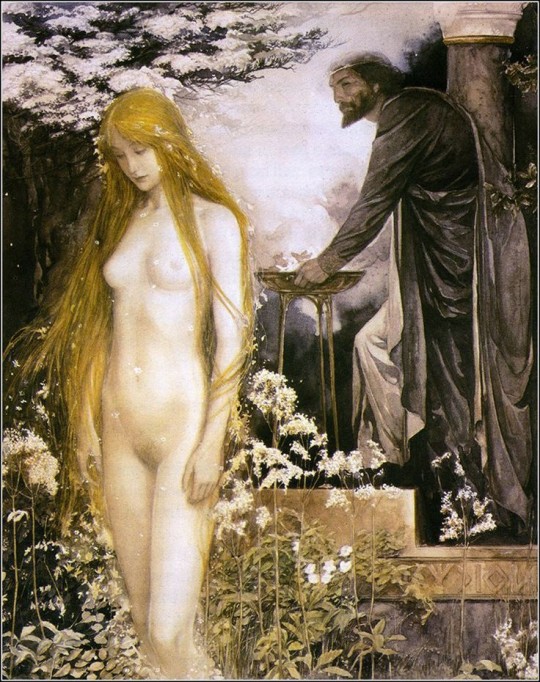

The main association she has to your chart would be your moon, which is the most important placement in every chart, in Rohini nakshatra. Rohini is fully in Taurus, it's the first moon-ruled nakshatra associated with the most unaware of passive feminine energy in its initial state. It's also connected to flowers. Rohini's power is to grow, like how toddlers start to grow in size as they absorb the world around them. Taurus rules the 2nd house naturally, but in your case it's actually in the 2nd house too, amplifying its effect. Moon is exalted in Taurus(in Krittika, but Rohini is also a good placement for it).
Rohini nakshatra is associated with such stories of women being created as grown adults with a specific intent and while being the object of desire. It's the unaware, submissive feminine.
All of your big three nakshatras have a theme of feminine passivity but in different ways. I just touched on Rohini.
Bharani is the mother nature, the discerning maiden, the embodyment of femininity in general, the yoni that purely reflects any impression made on it. It's Venusian, sexual, powerful and raw. Unlike lunar Rohini though, it's not about limitless enjoyment, but about the perfection of creation, enjoyment, being and the immortality of love, desire and venusian attachments.
Uttara Bhadrapada_ the warrior star, is a Piscean, watery, Saturn nakshatra that conquers and rules through obedience. Its perfection is achieved through cold precision and strength cultivated over time. Both Uttara Bhadrapada and Bharani relate to the immortality of the soul and can be viewed as nakshatras of sovereignty or honor. Rohini, being also passive, adds influence to the archetype that I'm about to bring up.
The sovereignty Goddesses are common in Celtic mythology. They largely relate to Bharani, but a lot of them are connected to Earth, making them also fit for your Rohini moon. They are also connected to granting rulership(Bharani and to some degree, Uttara Bhadrapada coorelation), while Bharani and Rohini both relate to being "the emboyment" that these goddesses are, the first nakshatra being the embodyment of desire, karma and universal law and the latter bring the embodyment of creative masculine energy manifested as a woman. They both relate to desire.
Goddess Gwehwyfar_ Arthurian Guinevere, is a sovereignty goddess representing the land of Albion(England). That's why anyone who wanted to rule in Camelot had to wed her. She's mostly resonant to Bharani but also fitting for Earthy passive Rohini and also passive, quietly powerful Uttara Bhadrapada. Her myths mainly focus on her marriage to King Arthur and later, her affair with Lancelot which led to the downfall of Camelot. Arthurian legends have many versions and different authors have added different stories throughout centuries, but Guinevere has remained a passive but crucial mythological character.
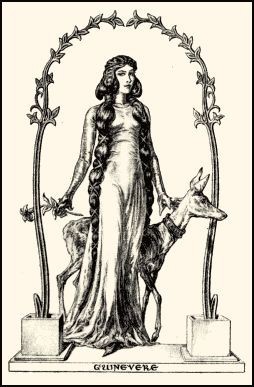
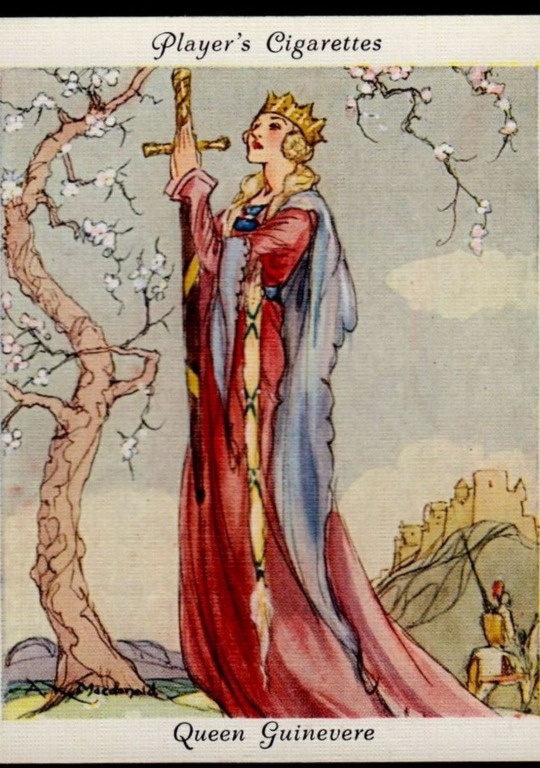
As an addition, I want to mention a few goddesses associated with Uttara Bhadrapada. Frigga_ Norse goddess of motherhood, love, nurture and fate. She's the consort of the highest standing Norse God_ the allfather Odin. Her silent knowing, power and associations birthing/motherhood makes her associated not with just Uttara Bhadrapada, but also with Bharani.
The same can be said about Greek goddess Psyche_ a human who was elevated to the status of a deity because of her love for Cupid. She relates to the purity of the soul, a theme found within both Bharani and Uttara Bhadrapada. Her butterfly/flying symbolism is related to Uttara Bhadra and the story of her myth is overall connected to it, but the aspect of her "elevating to another world" because of love can be connected to Bharani. According to Vedic texts, the result of Bharani is "moving on to another world", and its association with the power of love is prominent and quite famous in astrology.

I'm going to move on to Venusian Goddesses that also resonate to other parts of your chart than your big three.
Rohini is in Venusian Taurus, you have Ketu in Purva Phalguni, you obviously also have Venusian Bharani as ascendant but Bharani's rashi(Aries) lord(your chart ruler) is Mars(active version of it) and it's exalted in Martian Dhanishta in the 10th house which is the "best" possible nakshatra, sign and house placement for it. It affects visibility and makes the planet noticable to say the least. That's for an aspect of fierceness and passion to you that when mixed with Venusian influences, creates a very unique archetype.
Freya_ Norse goddess of love, passion, sensuality, war and chooser of slain. She is known for her radiant and passionate nature. This is the goddess that I associate with Bharani, but it can also definitely be associated to Purva Phalguni_ your Ketu, located in your 5th house of enjoyment and passion.
As the chooser of the slain, Freya has the first pick with which of the brave warriors she takes in her heavenly land of Folkvangr, Odin has the second pick. There is an side to her that is connected to the dead which most Venusian Goddessed don't have. But another definitely does.
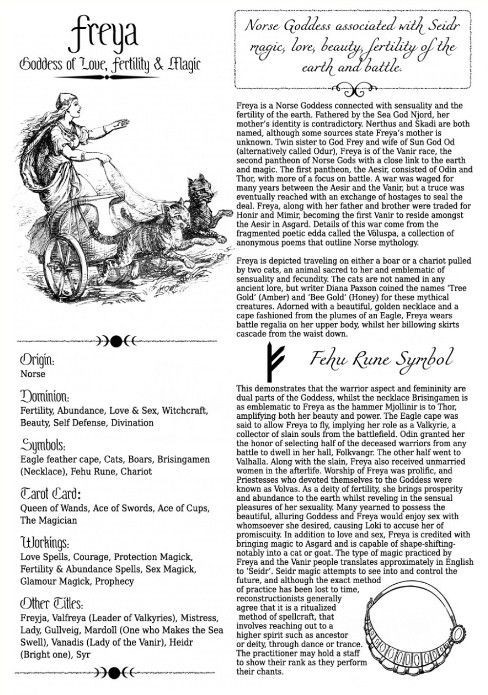
Inanna/Ishtar_ Mesopotamian Venusian Goddesses, often compared to each other, who descended into the underworld. Inanna went to the underworld to see her estranged sister_ Ereshkigal, who she was extremely afraid to see. You can research how her myth is told but an important symbol of hers is a lion. It was said that she is often mounted on one. Lion is Dhanishta's(your chart ruler's nakshatra) yoni animal. Her myth is about compassion, bravery, self-respect and power. She's called "the queen of heaven" and is associated with the evening star_ Venus.
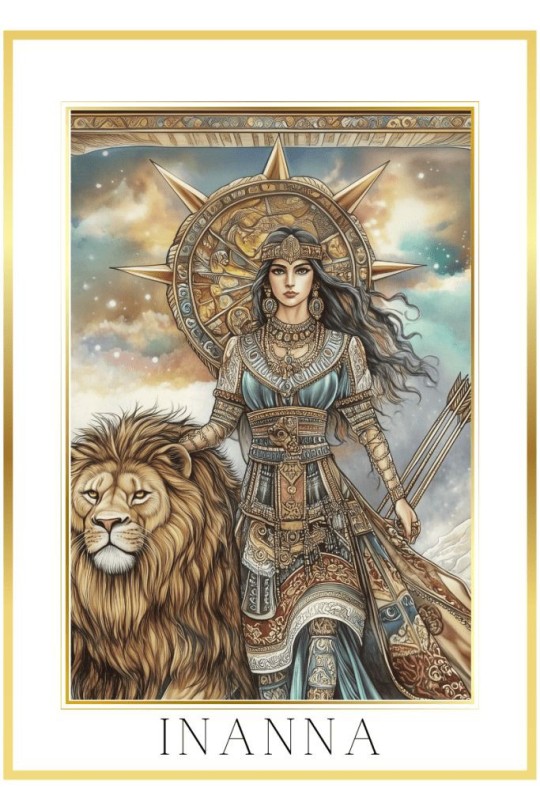
Another interesting part of your chart is Jupiter atmakaraka(the planet with the highest degree considered to represent the soul) in Jyeshta nakshatra. Jyeshta is fully in Scorpio(also a Martian sign) and in your case, it's also in the 8th house. First important detail to mention is that Bharani also has death associations, making your chart deep and intense, but secondly, and more importantly, it ties perfectly with and connects you again to Blodeuwedd.
Your moon is in Taurus, Rohini, second house. Your atmakaraka is in Scorpio, Jyeshta, 8th house. Both of these signs/houses/nakshatras deal with possessions and values in opposite ways. Rohini and Jyeshta are the two nakshatras connected to Blodeuwedd.
The goddess' symbol is an owl, Jyeshta's symbol, representing shrewd analysis and wisdom. It's also a protective force of nature.
The myth of why she is turned into an owl goes like this: One day her husband Lleu goes hunting. A young huntsman named Gronw comes ro her, seeking shelter, and he and the goddess experience love at first sight. He wanted to be with her so much that he persuaded her to kill Lleu.
They made the plan and Grown departs, leaving Blodeuwedd anxious about it coming together. Eventually, the prepare a bath on a riverbank with a thatched roof, so that it was neither indoors nor outdoors. As Lleu stood with one foot on the edge of the tub and the other on the back of the goat, Gronw threw a spear at him, hitting him on the side. Lleu turns into an eagle and flies off, surviving this attempt. He was discovered injured and nursed back to health by his cousins Math and Gwydion. The lovers are discovered and Gronw was killed. As to Blodeuwedd, she was turned into an owl_ a bird no other bird liked.
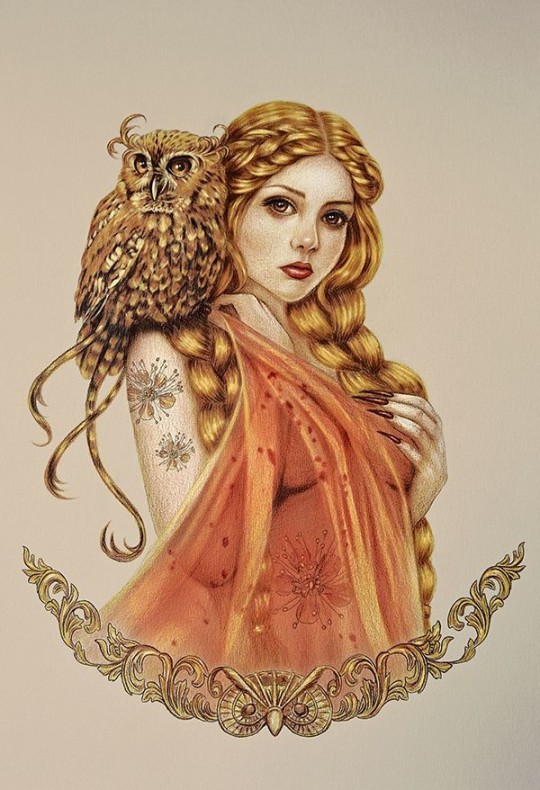

The goddess with no choice made one and was punished. This is the fate of the passive feminine, but her power is undeniable. Bharani relates to the struggle with free will, especially regarding love and independence, especially as a female/feminine, being power but not necessarily having it yourself. Rohini is the choiceless bride, while Jyeshta is the independent, wise woman, often seen as the protector of Rohini archetype. Blodeuwedd represents them both. Today, her name means "owl".
...
I hope this was informative and helpful.
Please leave a feedback in the asks after reading🤍 let me know if it resonated.
I still encourage you to research them yourself.
#vedic astrology#astrology#nakshatras#mythology#welsh mythology#celtic mythology#norse mythology#blodeuwedd#gwenhwyfar#guinevere#arthuriana#freya#frigg#psyche#inanna#ishtar#rohini#bharani#uttara bhadrapada#jyeshta#purva phalguni#dhanishta#moon#venus#mars#astrology observations#sidereal astrology#astrology tumblr#ask#goddesses
31 notes
·
View notes
Text
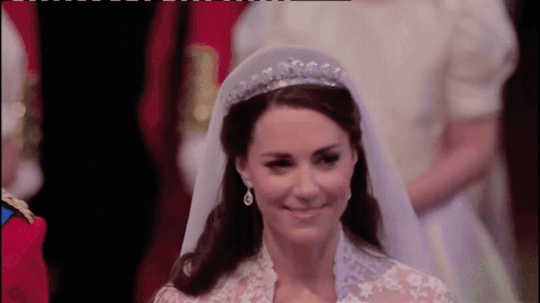
THE ROYAL CHRONICLES : The Royal Wedding of Prince William & Catherine Middleton .* :☆゚。 ・
HRH Prince William Arthur Philip Louis and Miss. Catherine Elizabeth Middleton married in a religious ceremony at Westminster Abbey on what is my favourite day ever aka 29 April, 2011.
For the day, William was in the red tunic of the Colonel of the Irish Guards uniform with a forage cap bearing the Irish Guards insignia. He wore the Order of the Garter Star and Blue Riband to which his RAF Wings & Golden Jubilee Medal were fastened.
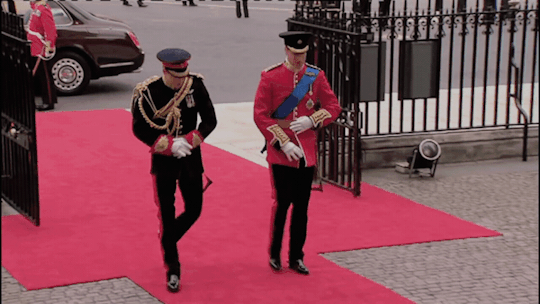
Meanwhile Catherine was a fairytale disney princess in a dress by Surah Burton of Alexander McQueen with the Cartier Scroll Tiara and a pair of diamond acorn earrings from Robinson Pelham. Her bridal bouquet featured myrtle, lily-of-the-valley, sweet William, ivy, and hyacinth.

Catherine was walked down the aisle by her father, Michael with whom she had travelled from Goring Hotel. Her sister Pippa was the maid of honour.

Will & Cat vowed to love, honour and cherish each other during the ceremony performed by the Archbishop of Cantebury.

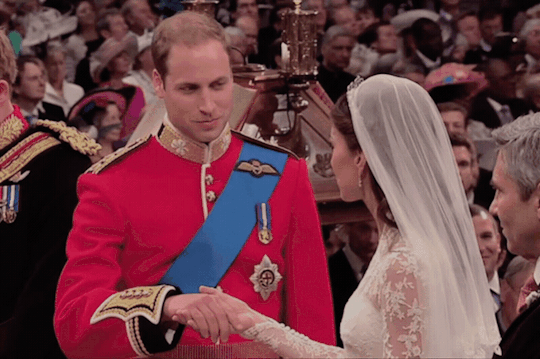
He gave Catalina a ring made from Welsh Gold keeping with the tradition within the Royal Family.
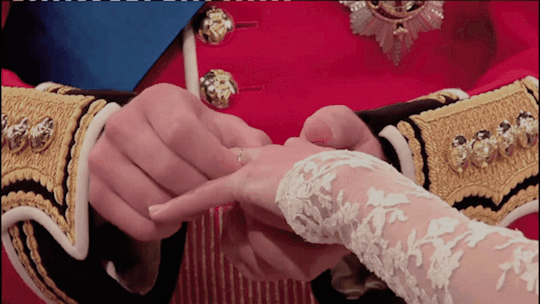
Following the ceremony in true fairytale fashion, the new Duke and Duchess of Cambridge travelled in a horse-drawn carriage procession to Buckingham Palace.

They appeared on the Palace Balcony and shared TWO KISSES to the delight of the crowd gathered below and to my Disney obsessed self who'd been glued to the TV the entire time.
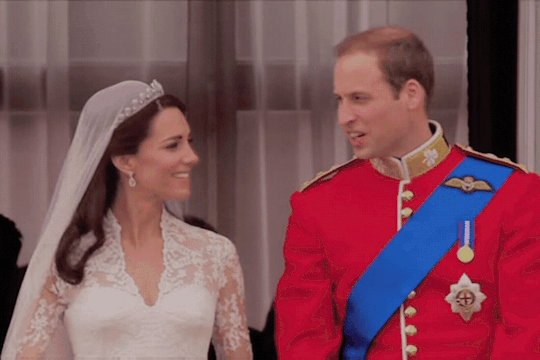
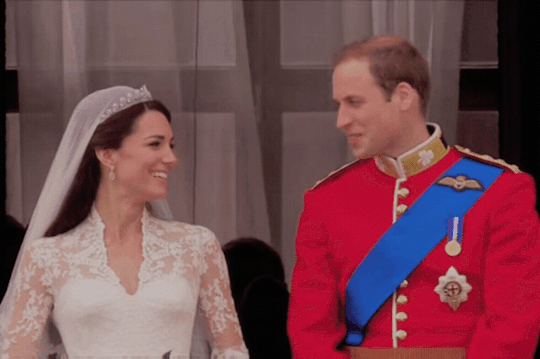
A Reception was held by the Queen in their honour at Bucking Palace, after which William drove his babykins to Clarence House in an Aston Martin DB6 Volante. Another private dinner was hosted by The Prince of Wales for his son and new daughter-in-law.
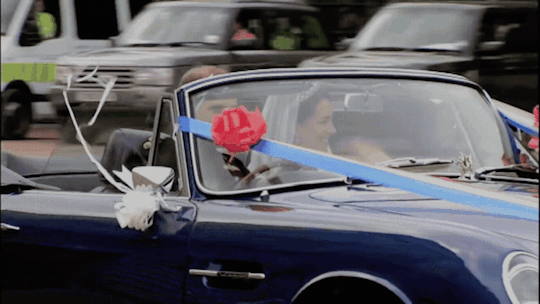
This was quite literally THE WEDDING OF THE CENTURY! Aaaahhh all those feels of the day, everything was just perfect. Honestly for me nothing is ever topping twenty-ninth of april of 2011. And I don't think there was anyone who wasn't enveloped by the happiness radiating off of these two that day.
Nobody can talk about the day without talking about the goddess that our homegirl looked like that day, KateEffect had always been a thing but THIS DRESS like >>>>
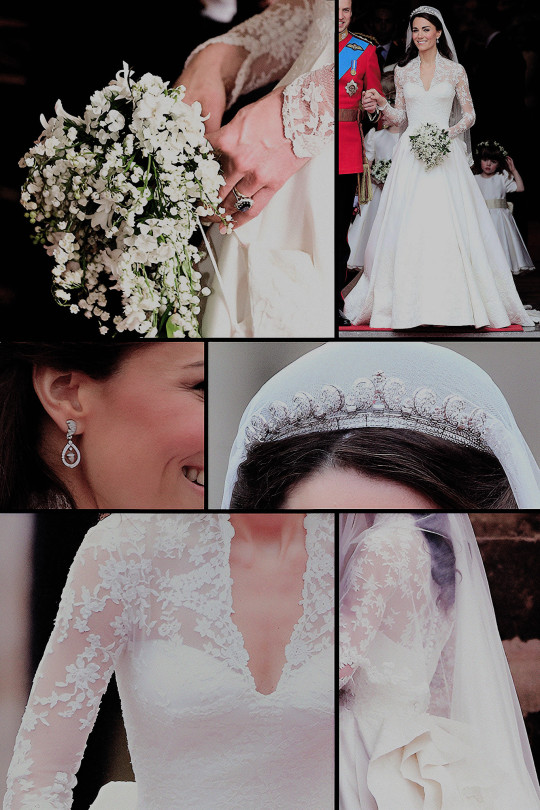
#british royal family#british royals#royalty#brf#kate middleton#british royalty#royal#royals#catherine middleton#duchess of cambridge#princess of wales#the princess of wales#princess catherine#princess kate#catherine princess of wales#william prince of wales#prince william#prince of wales#the prince of wales#the royal chronicles.#trc.#trc : the wedding 11#TheWedding11#royaltyedit#royalty gifs#royalty edit#royaltygifs#cat cambridge.#will cambridge.#duke of cambridge
99 notes
·
View notes
Text
discussing the prewett familys canon info and speculating off of it !! (and also a tangent about felix rosier and google being ridiculous)
people headcannon gideon and fabian to do pranks as well as the marauders… that was mentioned in atyd and i posted about the quote and i started rambling about them… came up with an idea i actually like and have been thinking about them nonstop.
so the prewetts consist of gideon and fabian (twins), and molly. HOWEVER the harry potter wiki itself says that billius prewett could be another sibling, or is a sibling in law. not sure, but something to keep in mind bc we can’t have another lost sibling.
(referring to felix rosier… ive looked this up before and google told me that YES, they are brothers. i have been living my life since thinking that YES they are brothers. i’ve even seen people saying YES they are on tiktok. but i googled it just now to make sure… and with what i’m reading right now it’s saying that felix rosier is evan rosiers son. and um?? if we’re continuing with the hc that evan was in regulus’ year…. that would have made evan be a father at age 8. so i’m saying that’s false and that they’re still just brothers.) (that was not at all necessary to this post but thought it was interesting and funny.)
anyway, i said yesterday that what if molly was involved with her brothers pranks… and maybe were even her idea, who knows? and with her living through both of their deaths, pranks remind her of them and she grows to resent said pranks. explains fred and george stuff in canon. and she maybe blames part of herself for their death because of it… “if i hadn’t been such a distraction to them, maybe they would’ve studied harder, could’ve been stronger and protected themselves” type of deal? explains more with fred and george. terrified history would repeat itself!! i think thats so interesting and i would love to just build upon any idea of them.
so the three of them are literally cousins to sirius and regulus through marriage. lucretia black (orions sister) married ignatius prewett (who is gid, fab, and mollys uncle) sirius could hate them just because they’re related and it could start an amazing prank war and friendship. like hello?? its right there.
and very interesting fact !! LUCRETIA WAS NOT DISOWNED FOR MARRYING HIM? even though alot of the prewetts would’ve been considered blood traitors (bc they are sacred 28) which is weird because the black family marries through status. which makes me thinkkk that maybe ignatius himself could have been REALLY powerful and therefore known as himself and not just a prewett or wtv so he was accepted in??? maybe he joined their side of the war and that helped… that could be so interesting…
molly named her son after him literally?? percy ignatius weasley. so assuming they were close at one point?? maybe he just meant a lot to her in life but after the wedding there was a falling out… she realizes how much he truly had changed. so we could say she names percy after him to commemorate the person he used to be?
and maybe molly resents lucretia for “changing” her uncle…. and therefore by extension has a distaste for sirius because that’s his aunt. it adds depth to her yelling at him in canon….
and the last name prewett is welsh in origin and i know not everyone enjoys the welsh remus headcannon… but a connection could be there!! imagine remus knowing them before school? i like to think they’re a tiny bit older than all the marauders, so imagine an older sibling dynamic? them all taking scrawny little loser nerd boy remus under their wings. and not at all a good influence, but we love them regardless. (and i say loser and nerd affectionately, i am one too ok… hes so me)
hope lupin would LOVE them. molly coming over to help hope bake. that’s an adorable thought.
and because of all of that !!! this is more wolfstar with the prewetts, but imagine a fic where welsh prewetts and welsh remus are friends and remus is at their house…
now imagine that walburga is just SO done with sirius that she sends him off to live with his aunt lucretia for a bit because she and ignatius don’t have kids of their own and they can handle it ig?? (never had kids in canon either btw)
and maybe sirius is acting out… doesn’t want to be there either obviously. he doesn’t like his aunt, and doesn’t like ignatius in relation.
and imagine ignatius still trying his best to still have some type of relationship with his niece and nephews despite the differences…
and so he goes to visit them and he takes sirius because 1 he isn’t trusted to be on his own right now because mr chaos and trouble follows me everywhere and 2 because maybe it’ll be good for him to spend a little time around people closer to his age. and he meets remus and they fall in love and blahblahblah kicking my feet and blushing !
going to try and make an actual headcannon post later, this is just stuff i found in canon that could link into the marauders so there’s a start yk? i would love love love to see them as super depth heavy characters
13 notes
·
View notes
Text
Æthelflæd’s authority initially passed to her daughter, a situation presaged by Ælfwynn’s prominent position in the witness list of S225, issued only three years earlier. Shortly after, though, to borrow the words of Henry of Huntingdon, ‘Edward, acting with regard to expediency rather than justice, disinherited Ælfwynn’ (HA v.17). Henry likely borrows his tone of indignance from the Register, to which he had access in some form. In its entry for 919, reporting Edward’s setting aside of his niece’s claim to lordship over Mercia, the Register declares that she was benumen, or deprived, of authority. Undoubtedly, the Register’s statement in the previous year that Æthelflæd had held ‘lawful authority’ was intended to foreground the legitimacy of Ælfwynn both inheriting and exercising that authority and, ergo, the injustice of Edward setting her aside.
As remarkable an event as the successful passing of hereditary rulership between mother and daughter would have been in the history of early England, it is not entirely certain that this was Æthelflæd’s ultimate design. Ælfwynn was likely approaching 30 years of age when her mother died, and there is no evidence that she had married. This situation was not one that engendered itself to stability of succession. Had Æthelflæd intended her daughter to rule over Mercia, it seems probable that she would have arranged a suitable marriage both to ensure her daughter had a network of independent support, and also to secure the continuation of a Mercian ruling family lineage. There is no hint at such a union in the historical record, nor of any attempt to arrange one.
This, perhaps, is where a hint of West Saxon hegemony throughout Æthelflæd’s reign may be found. If Edward had always intended to absorb Mercia under his overlordship, he may have forbidden his niece to wed: a deliberate strategy to extinguish the Mercian ruling family line and its claim to rulership. And Æthelflæd may have been complicit in Edward’s decision to formally annex Mercia to the West Saxon crown following her death, or at the very least accepting of it. The partisan nature of the Register must always be born in mind and, simply because it presents Æthelflæd as a paragon of Mercian lordship, it does not necessarily follow that this is how she viewed herself. Æthelflæd may have had royal Mercian ancestry, she may have advocated for Mercia and won over Mercian loyalties, but she was still the daughter and sister of West Saxon kings. Æthelflæd’s marriage had been informed by West Saxon dynastic politics, her father’s regional overlordship loomed large over her early years in Mercia, and she proved to be an active partner of her brother through the early tenth century.
In truth, Ælfwynn may only ever have been intended as a placeholder ruler. In this case, her political prominence, as attested in S225, would have been a mere expedient, ensuring that any power vacuum that arose in the event of Æthelflæd’s death would be filled until Edward could make his way to Mercia to claim its throne. At this moment, however, Edward was on campaign nearby in the Danelaw, and he made the formal annexation of Mercia his priority. Upon Æthelflæd’s death in Tamworth, the Chronicle A-text states that:
⁊ þa gerad he þa burg æt Tameworþige, ⁊ him cierde to eall se þeodscype on Myrcna lande þe Æþelflæde ær underþeoded wæs; ⁊ þa cyningas on Norþwealum, Howel, ⁊ Cledauc, ⁊ Ieoþwel, ⁊ eall Norþweallcyn hine sohton him to hlaforde. (And then he occupied the burh of Tamworth, and all the nation in the land of the Mercians which had been subject to Æthelflæd submitted to him; and the kings in Wales, Hywel, Clydog, and Idwal, and all the race of the Welsh, sought to have him as lord.)
There are several matters of note in this passage. Firstly, the word gerad (occupied) is an interesting choice by the annal’s author. This implies that Edward was not certain of his welcome in the Mercian burh, and so took a military approach to the town. The tone this sets for the rest of the entry is one of might, insinuating that the subsequent submissions resulted from Edward’s own power rather than from any arrangement with his sister. The A-text of the Chronicle, though, is no less partisan than the Register, and this entry seems to be deliberately constructed to cast Edward’s new hegemony over Mercia and Wales as a personal conquest. This raises the second matter, that of the Mercian submission. It is worth reiterating that, when the 918 entries of the Register and the Chronicle A-text are read together, there is little doubt that Edward, Æthelflæd, and their armies were collaborating in that year’s Danelaw campaign. In which case, as Maggie Bailey suggests, choosing Edward as leader may not have been difficult for the Mercians: here was a proven and successful military leader already known to the Mercian elites and their armies.
For her part, there is no evidence that Ælfwynn had any involvement with Mercia’s military, nor even that she had truly been given any authority at court prior to her mother’s death. It seems probable that the truth of events lies somewhere between the Register and Chronicle account of events, that Edward attended Tamworth upon news of Æthelflæd’s death, whereupon the Mercian elites chose him as their lord.
— Matthew Firth, Early English Queenship, 850-1000: Potestas Reginae
#Imo it's an interesting alternate interpretation#you (generally speaking) don't have to agree with it but I personally find it convincing and plausible#aethelflaed#aelfwynn of mercia#anglo-saxons#edward the elder#english history#historicwomendaily#women in history#my post#Alternatively Aethelflaed may not have intended for her daughter to succeed her but Aelfwynn may have tried to do so anyway?#Or maybe it was accepted that Edward the Elder would rule Mercia but he and Aelfwynn had disagreements on her future#Which may perhaps explain why it was said that he used force#The alternate explanation to this is just that he was presenting himself as a militaristic ruler as was typical#(Yes I know all of this is pure wild speculation on my part that's why it's in the tags)
6 notes
·
View notes
Note
Did Henry Tudor meet Elizabeth of Edward IV of England and York in house of york?
Hello, I'm not sure I understand your question. Are you asking if Henry Tudor ever met Edward IV and Elizabeth of York whilst Edward was still king? It's impossible to know, but there might actually be a possibility that Henry met Edward IV (less likely he met Elizabeth imo). To be clear, this is a personal theory based on some of the testimonies given for Henry and Elizabeth's marriage dispensation in 1486.
William, earl of Nottingham (64 years old): 'says that he has known the aforesaid prince Henry well for twenty years and more, and the said lady Elizabeth for sixteen years' => That means he knew Henry since at least 1466, and Elizabeth since 1470/1.
Sir Richard Croft (54 years old): 'says and answers that he has known king Henry well for twenty years, and the said lady Elizabeth for sixteen years' => Again, that means he knew Henry since at least 1466 and Elizabeth since 1470/1.
Sir William Tyler (43 years old): 'says that he has known prince Henry [now king] well for twenty years, and the lady Elizabeth for twelve years' => That means he knew Henry since at least 1466 and Elizabeth since 1470/1.
Those two dates are relevant to the Yorkist establishment (hold this thought). I think it's possible those three men first met Elizabeth of York as she fled with her mother and siblings in 1470 to the Tower and then to Westminster Abbey, or they might have met her in 1471 when Edward IV returned and rescued his family from sanctuary. I don't know exactly what kind of ceremonies were held after Edward's triumph over the Lancastrians but it's possible Elizabeth was present on those occasions.
Some of the other witnesses said they knew Henry for sixteen/fifteen years as well — specifically Christopher Urswyck (Margaret Beaufort's confessor) and Sir William Knyvett. It would make the most sense for the majority of people to say they knew Henry since 1470/1, considering Henry Tudor came to London during the readeption of his uncle Henry VI, and would have met the courtiers at that time. But those three people* — the Earl of Nottingham, Sir Richard Croft and Sir William Tyler — said they knew Henry at least since 1466. What was Henry Tudor doing in 1466?
At that time Henry was a 9 year-old in the custody of William Herbert, an important representative of the Yorkist king in Wales described as 'King Edward's master-lock'. It's possible William Berkeley (later Earl of Nottingham), Sir Richard Croft and William Tyler all knew Henry from visiting the Herberts in Rhaglan Castle**, though it's impossible to say if they had any degree of personal friendship with the Herberts. In 1466 there was however an event that was of importance for both the Herberts and Edward IV.
In that year William Herbert married his eldest son and heir to Mary Woodville, the king's sister (in-law) in a ceremony that took place in Windsor Castle, one of the king's residences. It was apparently such a great event a Welsh poet later praised it in one of his poems dedicated to Willaim Herbert:
The foremost king of Britain and its realm / Gave his sister to him / He held a great wedding-feast in Windsor / For this man, in his royalty / A generous feast for our lord who is of our tongue, / May he be seen again as a prince!
This is pure speculation but I ask myself: is it possible William Herbert took his whole family to Windsor, including his ward Henry Tudor, for his son's wedding feast? If so, many Yorkist partisans such as the Earl of Nottingham and Sir Richard Croft would have had the opportunity to meet Henry on that occasion — in turn, Henry would have had the opportunity to at least see King Edward. Of course there's no way to really know that whilst no concrete evidence comes up, but it's fascinating to think Henry might have seen/know Edward IV.
This isn't taking into account, for example, the possibility that Edward IV might have visited William Herbert at Raglan in one of his travels, to which Henry would have seen him as well. A royal visit to Raglan is the only way I can think of that Henry might have seen Elizabeth of York, as she was only merely a few months-old at the time of her aunt's wedding in Windsor, and would not have attended the ceremony. Furthermore, if Henry and Elizabeth had been present on the same occasion/wedding the three witnesses above would have given the same number of years for knowing them both***, which was not the case.
However, I think a royal visit from Edward IV to Raglan is less likely, given it was not documented anywhere, not even in Welsh poetry, and William Herbert was enough of a patron to have this visit documented in that way. So all in all, I think it's very unlikely Henry Tudor ever met Elizabeth of York before 1485, though I think there's a slight chance that he have met Edward IV in 1466. Again, this is all pure speculation, though.
_____________
* It's important to notice that all three were Yorkist partisans: Sir Richard Croft fought at Mortimer’s Cross, Towton and Tewkesbury on Edward IV's side — he and his brother were tutored with or were the one who tutored Edward whilst Earl of March and his brother Edmund in Ludlow*. Apparently the letter Edward and Edmund jointly wrote to their father Richard of York complained about Sir Richard Croft and his brother. The Crofts were neighbours of the Mortimers, which then encompassed Richard of York and his sons. The Battle of Mortimer's Cross took place on Croft soil. Sir Richard's wife Eleanor ran the household of Edward Prince of Wales, Edward IV's son, and his younger brother (also called Richard Croft) was one of Edward's tutors in Ludlow. Henry VII later made Sir Richard Croft his treasurer, and also made him Prince Arthur’s steward in Ludlow later on.
William Berkeley was created Baron Berkeley by Edward IV and became one of his privy councillors in 1482/3. He might have been the same William Berkeley, knight of the Body, who was attainted in Richard III’s Parliament and joined Henry in exile. It would be weird for the act in Parliament not to mention his title, though, since he was created Earl of Nottingham two days after Richard III was declared king. Either William Earl of Nottingham or this other William Berkeley, knight of the Body, hosted Margaret of York when she visited England in 1480.
** It would be really awkward if William Berkeley (later Earl of Nottingham) was intimate enough to visit the Herberts, considering he killed in battle William Herbert's son-in-law, Thomas Talbot, 2nd Baron/Viscount Lisle (Margaret Herbert's husband) after Lisle challenged him to a trial of arms over the Berkeley lands in 1470. Lisle had been Herbert's ward in the same way Henry Tudor had been. His wife Margaret Herbert miscarried a boy shortly after his death. I believe this is the dowager Viscountess of Lisle that Henry granted a financial settlement in 1492.
*** For example, Sir William Knyvett said he knew Elizabeth of York from the day of her birth 🥺 (and had known Henry for fifteen years, that is, since 1470/1 the Readeption years).
22 notes
·
View notes
Note
Prompt anakin is still a virgin. Obikin wedding-night
I combined this one with - I see that we've been torturing poor little meow meow recently, so how about Anakin struggling with his depression. maybe Obi-Wan has to comfort him or even just drag him out of bed because it's the middle of the afternoon. what can I say, I like projecting onto blorbo from my show and teen anakin is kidnapped. - to come up with some sad fic about Anakin realising he hasn't been following the Code properly...
(Because, I know, this doesn't answer your prompt at all but it's like 100% the result of it. I got this while doing some work on Hywel Dda (medieval welsh law) - virginity is a legal construct/property that can be stolen but also restored via payment of fines/castration of the thief - and kept thinking how tragic it would be if Anakin's understanding of virginity / being chaste was completely out of line with the Jedi's because of his upbringing...)
1300 words | rated M
14 notes
·
View notes
Text
The Queen of mischief: A wicked talent for impressions, why she calls herself Miss Piggy and how Her Majesty loves it when a titled lady starts swearing by Richard Kay & Geoffrey Levy (March 17th 2016)
ARCHIVE LINK
As the Queen climbed into the open carriage for a birthday drive through the streets of Windsor, there on the seat lay a bouquet of flowers and beside it a birthday card in an envelope.
First, she smelled the flowers. Then, as she settled back on the cushioned seat, she opened the envelope and looked at the card — and burst into peals of laughter.
The card, which was signed by all the staff in the Royal Mews at Buckingham Palace, where the royal carriages and horses are kept, depicted Miss Piggy, the Muppet character.
‘I thought, “Well, she can’t sack us all,” ’ says coachman Alfred Oates, now 76, who was with the Queen for 57 years. ‘But there she was, as the crowds could see, laughing the whole way round.’
It was the Queen’s 60th birthday and the crowds didn’t know of the in-joke that had existed between the Queen and her staff since the wedding of Charles and Diana five years earlier.
It was at an after-wedding party watching video highlights that the Queen, Martini in hand, called to her husband: ‘Oh Philip, do look! I’ve got my Miss Piggy face on.’
It wasn’t long before what had been an intimate — and quite inexplicable — family joke had spread throughout the staff.
Even Princess Diana took to referring affectionately to her mother-in-law as ‘Miss Piggy’.
Almost 30 years after that Miss Piggy carriage drive, and with her 90th birthday approaching next month, laughter is as important as ever to the Queen.
But astonishingly, as she enters her tenth decade, the sober side of her ‘job’ remains as important to her today as it did when she first received those red boxes of government papers 64 years ago.
Indeed, she reads them as studiously as ever, still spending at least an hour a day going through them and noting her observations.
As Sir John Major, the ninth of the 12 prime ministers to serve her during her reign, tells us: ‘Remarkable, yes. But surprising, no. For the Queen is an assiduous guardian of the interests of this nation — and those of the Commonwealth.’
She has been seeing government papers since the final weeks of Clement Attlee’s post-war Labour administration in 1951. Because of her father George VI’s worsening health — a heavy smoker, he died of lung cancer aged 56 in 1952 — she was allowed to see Foreign Office telegrams while he was still alive.
Since then her deep interest and involvement in what her government is doing, and what is happening in the country, has never slackened, even at the weekends. As Sir John observes: ‘It is extremely important to her, personally, that she is kept informed about how policies will affect her people.’
In all these years of hardly putting a foot wrong she has done so just twice, according to her former Private Secretary, Sir William Heseltine.
The first concerned the Aberfan disaster in 1966, when a slag heap in the Welsh mining village near Merthyr Tydfil slid on to a school, killing 116 children and 28 adults. Her initial thoughts were not to go there.
‘Her attitude was highly principled: “If I go down, people who are digging children out of the mud will have to stop and talk to me,” ’ says Sir William. ‘But in the country there was strong feeling that the tragedy needed her healing presence.’
It was eight days before she went and, he says, ‘the fact that she was there healed whatever wound there might have been, but it was late. She shed tears down there. Who wouldn’t have done’.
This delay in visiting the South Wales village has remained, perhaps, the Queen’s greatest regret.
The second time, which Sir William believes the Queen accepts as an error, was failing to have the flag above Buckingham Palace lowered on the death of Princess Diana, which we revealed earlier in this series.
But the two episodes haven’t changed Sir William’s admiration for the Queen’s seven-day work ethic.
As he recalls: ‘On Friday afternoons when Whitehall was clearing its desks there was always a lot of paper that required a decision of some sort by the Queen. She dealt with it on Saturday nights or Sunday. The (red) boxes were always in Whitehall by Monday lunchtime.’
This is a ritual that Philip has had to come to terms with, for even now, if they are together when the government boxes arrive, she gives up whatever they are doing and goes off to deal with them.
‘He found this so hard to handle in the early days, but he looks at her with a certain admiration now,’ says an aide.
One of the Queen’s former ladies-in-waiting, Jean Woodroffe, 93, goes further. ‘I think their relationship has evolved,’ she says. ‘Prince Philip is much kinder than he used to be. I mean, he was never unkind, but he’s more protective of her.’
The Queen often leans on him when surrounded by people who are strangers for, surprisingly, she is ‘shy by nature’, says a former senior courtier.
Distinguished artist Michael Noakes, who has painted her several times and knows her well, explains: ‘Sometimes she has to rather gather herself together before she can quite face going into a room where everyone will be looking at her.
‘When Prince Philip sees that happening he takes over, in a subtle way, and makes sure everything is OK. He says he can make people laugh within 15 seconds.’
But he can also be ‘cantankerous with people, and occasionally around the Queen’, says a former senior aide, adding: ‘What people don’t realise is that for the past 20 years he has suffered from acute arthritis, which can be very painful.’
Sir Nicholas Soames, former Tory minister and grandson of Sir Winston Churchill, says: ‘Prince Philip is a product of his age, of a wartime generation that doesn’t whine and whinge like today’s generation do about everything.’
The Queen’s reciprocal support for Philip — they celebrate their platinum wedding (70 years) next year — is when he is carriage driving.
Stephen Matthews, 63, former head coachman at the Royal Mews, says the happiest he has seen her is when she is watching Philip controlling a carriage-and-four in a competition.
‘She’ll see him going through one hazard and then race in her Land Rover to get to the next obstacle in time to see him take that,’ he says. ‘She gets very excited when he’s doing well.’
Philip’s admiration for his wife was once based fundamentally on her orderly mind and devotion to her duties. But something has changed in their relationship over the years. ‘Once she always laughed at his humour,’ says a former equerry. ‘He now laughs at hers.’
Indeed, friends have noticed that something of his mischievous humour has rubbed off on to her. Not his salty brand of naval wit and throwaway observations that have caused insult in places as far apart as China (‘slitty eyes’) and Hungary (‘pot bellies’). That’s not the Queen at all.
Irreverent impressions are her forte and she has had the Prince in stitches. There was the time a North Country mayor was introduced to the Queen and insisted on complimenting her by telling her how much prettier she was in the flesh than in her pictures.
‘Later that day the Queen did an impression of the poor man telling her this in a northern accent, which had everyone holding their sides — including Philip,’ says a retired courtier. ‘She wasn’t mocking him, just having fun.’
Michael Noakes was at Buckingham Palace painting the Queen for the City of Manchester in her Order of the Bath robes, and for the best light effect he had her standing near a window in the Yellow Drawing Room.
As he recalls: ‘She was peering out of the window and keeping up a running commentary of people’s reactions to seeing her standing there — “ ‘Gee Maud (in an American accent) it can’t be’ . . . oh no, he’s decided it can’t be, he’s moved on now’ and that sort of thing, and “Ooh, a car has just been hit by a taxi, I think there’s going to be a fight now”. She is very funny.’
Sir Antony Jay, co-author of Yes Minister and Yes, Prime Minister, who also wrote the script of the ground-breaking 1969 television documentary Royal Family, recalls finding the Queen to be not as he expected when he sat next to her at a lunch.
‘She’d just had her portrait painted and was rather acid about the artist rather than the portrait,’ he says. ‘She was confident and opinionated in a way you would never see in public.’
After the success of Yes Minister, he and the Queen’s former Private Secretary Sir William Heseltine, a close friend, hatched a plot for a Yes Ma’am tv series, but Sir William assures us: ‘It was just a private joke.’
A pity — because the Queen’s wit can be deliciously dry. Coachman Colin Henderson, 69, was with the Queen at the Royal Windsor Horse Show when one of her grandchildren came up to her in the Royal Box. He recalls: ‘The Queen said: “Did you have a good lunch?” and the child replied: “Yes, granny.” To which the Queen said: “I thought so — you’ve got it all down your front.” ’
One running joke involved Audrey Dellow, the organist for 40 years in the Royal Chapel at Windsor who, according to Canon John Ovenden, Chaplain to the Queen at Windsor for 14 years until 2012, competed with Her Majesty every Sunday over who was wearing the best hat.
‘She could see the Queen in her mirror because the organ was almost opposite the royal pew,’ says Canon Ovenden. ‘Everyone was in on the joke — the Queen has an impish sense of humour.’
Going to church remains a key element of her life. The strength of her faith first emerged when her grandfather George V, who doted on his granddaughter Lilibet, was nearing death in 1936 and the Archbishop of Canterbury, Cosmo Lang, took her for a walk.
‘Please do not tell me anything more about God,’ the little girl, not yet ten, counselled the Archbishop. ‘I know all about Him already.’
This faith is familiar to Canon Ovenden. He recalls occasions when she has touched down at Heathrow after a foreign tour at 5am on a Sunday morning — ‘but blow me down, there she is in church for matins.’
One thing that makes her laugh out loud is when things go wrong in church. Canon Ovenden recalls a Sunday service when he called out the first hymn and the organist struck up the wrong tune.
‘I had to say “Stop!, start again,” and the Queen loved it.’
She also laughs out loud when one of her great friends, a titled lady who in recent times has sadly suffered from the neurological condition Tourette’s syndrome, uses language more associated with the saloon bar on a Friday night. In the middle of a conversation with the Queen, she is prone to suddenly blurting out: ‘Oh, do **** off, Lilibet.’
When the Queen first told former naval officer Philip about it over supper, he loved it. Surprisingly, they don’t have all that many suppers together. Neither travels as much as they once did, of course, but both continue to carry out many official engagements and don’t meet up very often for meals.
The Queen, like millions of other people, is fond of having supper on a tray in front of the television. (She made a point of watching the Downton Abbey Christmas Special while at Sandringham.)
She will have ordered her supper earlier with a tick from a choice of three main courses — no starters — on a leather-bound menu embossed in gold.
One of her favourites from childhood, always on the menu, is Gaelic steak — a filet steak cut into strips with a whisky and mushroom cream sauce.
She is not much of a pudding eater, and neither is Philip. At lunchtime, the Queen prefers cheese and in the evening fruit to finish. A favourite of them both is savoury souffle. When they do eat together they follow an old palace tradition of the menu on the table being written in French.
Before they dine, they like to have a drink. The Queen’s evening favourite is a ‘very dry’ dry Martini, made from gin straight out of the freezer with the merest dribble of Vermouth. Says an aide: ‘Sometimes people have forgotten to put the Vermouth in and she doesn’t notice.’
For his part, Philip will have a whisky and water or a Bacardi and tomato juice. They rarely drink wine or champagne, except for toasts.
Former Palace chef Darren McGrady, who also worked for Princess Diana, says that one thing the Queen has never made a fuss of is her birthday. ‘She is often alone for tea on the day,’ he says. ‘But in the Palace kitchens, we would never forget it.’ This year, as ever, they will make her the special 12in chocolate ganache birthday cake, using the same recipe (see above) created in the 19th century for Queen Victoria by her Swiss masterchef Gabriel Tschumi, who also worked for Edward VII and George V.
It is always piped simply ‘Happy Birthday’ in white royal icing. Nothing more — and definitely no candles. If the Queen is by herself, a small slice is cut for her.
On every other day of the year she has scones for tea, one day plain, the next fruit, and small, rectangular sandwiches, the bread cut exactly a quarter of an inch thick and the crust removed.
An enduring teatime favourite that goes back to her childhood with Princess Margaret are ‘jam pennies’: seedless raspberry jam sandwiches stamped out about the size of an old penny.
She also likes the cucumber in her sandwiches to be cut lengthwise to avoid the pips in the soft centre. The waste-nothing Queen has the skins sent down to the cellars as garnish for Pimm’s.
Some around the palace insist the Queen’s interest in her food is rather less than her interest in the food she gives her corgis. Nothing is allowed to come between her and their mealtimes.
Even the ancient routine of the Garter ceremony at Windsor has been interrupted for her to feed them, on one occasion removing her blue velvet robe to reveal the long white gown with a blue sash, plumed hat and white gloves, as she put out the food into five bowls on a small side table.
What followed proved what the Marquess of Salisbury says, that the Queen ‘is the most remarkable controller of dogs . . . she is a genius for it’.
‘One of the dogs was having fish, another meat, one had this special powder to take, another a pill that she had to crush — she knew precisely what to give each one, and still in her Garter finery,’ recalls a footman.
‘The dogs sat in a semi-circle at her feet and waited with remark-able patience. Finally, she put the bowls — they’re all old silver and porcelain dishes — down on the floor and still they didn’t move, like soldiers waiting for a command. And then she said “Eat, feed” and they did. Only then did she go through for tea with the knights, who were waiting for her.’
So, as we have seen, the Queen can be a completely different person away from Palace formality. Petty Officer William Evans remembers a shooting party at Balmoral where he was assisting Earl Mountbatten when the Queen drove up in her Land Rover with a box of hot baked potatoes wrapped in tin foil in the back.
‘Who wants a hot potato?’ she yelled, opening the boot.
Says Evans: ‘I put up my hand and she tossed one straight at me from at least 20 ft.
‘And suddenly the air was thick with hot potatoes as she threw them around, including one to a grinning Prince Philip. It all seemed so natural. The look he gave her said so much.’
Inevitably, people wonder just how she would cope if she lost Philip, who will be 95 in June.
Says her cousin and lifelong friend Margaret Rhodes: ‘I don’t know how much she would do a Queen Victoria and sit in the background while she was getting over it. She would never consider stepping down.
‘I remember someone once repeating my words, saying that she wasn’t going to abdicate. When I next saw the Queen, she said to me: “You should have said, ‘She would want to go on being Queen unless she had Alzheimer’s or suffered a stroke.’ ” ’
Her 90th birthday may be only weeks away, but this extraordinary woman is as indefatigable — and resolutely dedicated to her duty — as ever.
#brf#royal anecdote#wait here while im gonna go and cry in the corner#i miss her a lot#queen elizabeth ii#prince philip#duke of edinburgh
5 notes
·
View notes
Text
This day in history

Today (May 7), I’m in Berkeley at the Bay Area Book Festival for an 11AM event with Wendy Liu for my book Chokepoint Capitalism.
Weds (May 10), I’m in Vancouver for a keynote at the Open Source Summit and a book event for Red Team Blues at Heritage Hall and Thu (May 11), I’m in Calgary for Wordfest.

#20yrsago Future of Music coalition open letter on media consolidation https://web.archive.org/web/20030504023803/http://www.futureofmusic.org/news/fccmusicianletter.cfm
#20yrsago The Web makes writing better https://web.archive.org/web/20030509221227/http://www.guardian.co.uk/online/story/0,3605,950915,00.html
#20yrsago A (dangerous) primer on hardware hacking https://hackingthexbox.com
#15yrsago House passes bill that will let the RIAA take away your home for downloading music https://www.govinfo.gov/content/pkg/BILLS-110hr4279rh/pdf/BILLS-110hr4279rh.pdf
#15yrsago Using a record-cutter to turn old CDs into 45RPM singles https://web.archive.org/web/20080502021126/http://www.futuresonic.com/08/art/cdrecycled/
#15yrsago BBC sends legal threat over fan’s Dr Who knitting patterns https://www.openrightsgroup.org/blog/bbc-removes-doctor-who-fans-knitting-patterns-from-the-web/
#15yrsago Band “shoots” video by sending Data Protection Act requests to CCTVs that caught them performing https://web.archive.org/web/20080510192510/http://www.telegraph.co.uk/news/newstopics/howaboutthat/1938076/The-Get-Out-Clause%2C-Manchester's-stars-of-CCTV-cameras.html
#15yrsago RIAA says DRM is coming back — in the future, you won’t own music https://arstechnica.com/tech-policy/2008/05/if-music-drm-is-dead-the-riaa-expects-its-resurrection/
#15yrsago UK blacklist of “suspicious” store clerks includes people never charged or convicted https://news.bbc.co.uk/2/hi/uk_news/magazine/7389547.stm
#15yrsago HOWTO detect hidden video cameras https://www.instructables.com/How-to-locate-pinhole-cameras
#10yrsago Hedge fund managers suck at making money (for you) https://www.cnbc.com/id/100718881
#10yrsago HOWTO build a working digital computer out of paperclips (and stuff) https://memex.craphound.com/2013/05/08/howto-build-a-working-digital-computer-out-of-paperclips-and-stuff/
#10yrsago Disney files trademark application for “Dia de Los Muertos” https://web.archive.org/web/20130508212616/http://www.stitchkingdom.com/disney-dia-de-los-muertos-trademark-62484/
#10yrsago Faced with excommunication threat, Irish PM explains separation of church and state to Cardinal https://www.irishtimes.com/news/politicians-have-responsibility-to-legislate-on-abortion-issue-1.1383262
#5yrsago Georgia’s governor has vetoed SB 315, the state’s catastrophically stupid cybersecurity law https://www.eff.org/deeplinks/2018/05/victory-georgia-governor-vetoes-short-sighted-computer-crime-law
#5yrsago Equifax finally publishes a tally of what got breached when it left 146.6 million credit files unsecured https://arstechnica.com/information-technology/2018/05/equifax-breach-exposed-millions-of-drivers-licenses-phone-numbers-emails/
#5yrsago Over 55,000 security camera DVRs are vulnerable to an exploit so simple it fits in a tweet https://www.bleepingcomputer.com/news/security/new-hacking-tool-lets-users-access-a-bunch-of-dvrs-and-their-video-feeds/
#5yrsago Jeff Sessions tells border guards to separate children from their parents https://www.alternet.org/2018/05/jeff-sessions-says-border-agents-will-separate-undocumented-kids-their-families
#5yrsago An upcoming Supreme Court ruling could force all workers into forced arbitration, deprived of the right to class lawsuits https://www.epi.org/blog/the-supreme-court-is-poised-to-make-forced-arbitration-nearly-inescapable/
#5yrsago Welsh police deployed facial recognition tech with a 92% false positive rate, but they’re sure it’s fine https://arstechnica.com/tech-policy/2018/05/uk-police-say-92-percent-false-positive-facial-recognition-is-no-big-deal/
#5yrsago Should I use an algorithm here? EFF’s 5-point checklist https://www.eff.org/deeplinks/2018/05/math-cant-solve-everything-questions-we-need-be-asking-deciding-algorithm-answer
#5yrsago Google announces ad-ban for sleazy bail-bonds companies https://arstechnica.com/tech-policy/2018/05/first-google-banned-payday-loan-ads-now-it-will-ban-bail-bond-ads/
#5yrsago AT&T to the Supreme Court: “Fuck the FTC” https://arstechnica.com/tech-policy/2018/05/att-will-ask-supreme-court-to-cripple-the-ftcs-authority-over-broadband/
#5yrsago Here’s why everyone in the world just emailed you a new privacy policy https://www.eff.org/deeplinks/2018/05/why-am-i-getting-all-these-terms-service-update-emails

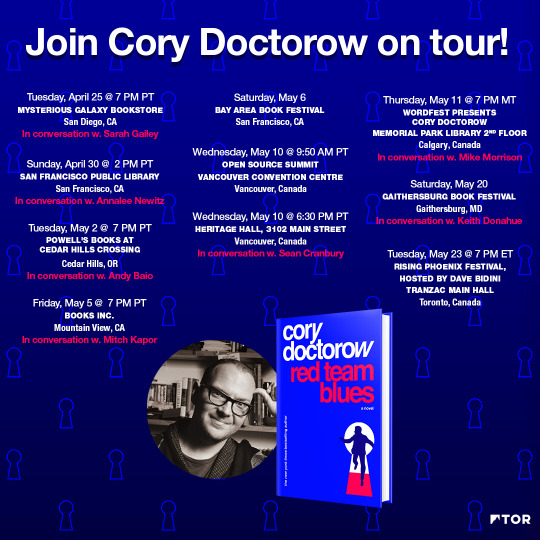
Catch me on tour with Red Team Blues in Berkeley, Vancouver, Calgary, Toronto, DC, Gaithersburg, Oxford, Hay, Manchester, Nottingham, London, and Berlin!
8 notes
·
View notes
Text








Happy Tuesday!! So, it Took A Lil Minute for the Playdate Pals...
To finally warm up to one another! All being the only small children in their households, their mothers had brought them together for a summer playdate, smiley potato fries and all! (This was due to the beginning of ts4 story progression ruining our lives lmboo)
Mrs. Welsh (Justine Welsh; Roger's mom) noticed her future daughter-in-law looking a bit left out, and made sure to pull her to the side, distracting her with discussions of the final wedding details!
Previously. (Wedding Update Part II.) | Next. (The Best of Friends...)
#ts4 gameplay#black simblr#black simmer#thedysonsistersts4#ts4 screenshots#simblr#sims 4#sims 4 gameplay#ts4#nyrarachelle plays.#black sims 4#sims of color#ts4 toddlers#ts4 exterior#the sims 4#ts4 legacy
4 notes
·
View notes
Text
Helo, helo, helo! Getting this marriage law edition out quickly as I am ON THE BEVS TONIGHT (wine. I've had a horrid day ffrindiau. I need this.)

So! Last time we spoke about Amobyr and Cowyll, this time it's Gwaddol and Agweddi!



So, Gwaddol is relatively simple but it is also referred to as Agweddi even though they are VERY different. Gwaddol is the right for a daughter to have her share of her father's movables (so cutlery, livestock, plates, furniture, stuff like that.) by dowry provision.
The word itself translates to 'gift, distribution, division,' which neatly tells you exactly what that particular law was about. It's VERY rare in law texts of the time because it was just usually lumped in with 'Agweddi.' According to certain texts (Peniarth MS. 28) a man who failed to rebut a charge of rape on a woman who was walking alone was 'required to pay her gwaddol,' which suggests that the gwaddol in that case was paid as a mark of a woman's chastity. (However, I would argue this particular case is much more likely to be a case of the law being classed under Cowyll rather than Gwaddol but I am not an academic.)
Next, Agweddi!
This one is slightly more fun! Agweddi is perhaps the most complicated law of the bunch and - as discussed - is somewhat of an umbrella term for other laws.
Now, Agweddi is, delightedly, a dowry payable to a wife whether she was a virgin or not by a husband when the marriage was consummated with sureties being given for its payment before marriage. Always good to get some assurances. You'd also get it for rape.
The agweddi was mentioned in The Mabinogion. The Dream of Macsen Wledig mentions it saying, 'Early the next day the maiden [Elen] claimed her maiden fee since he had found her to be a virgin.' Way to go, Macsen. As well as this, it's also found in Culhwch and Olwen: 'They [Culhwch, Bedwyr, Cai, etc.] said, "Ysbadden Pencawr, give us your daughter in exchange for her dowry and her maiden-fee to you and her two kinswomen."'
So, it's a BIG FUCKIN DEAL. It's perhaps what I would classify as being the 'main law' or your big-hitter. Certainly, that one and the Cowyll are, arguably, the most important. Agweddi was fixed in terms of how much each class had to pay, like the Amobyr and the Cowyll, and there may have been a marked difference between if your family was giving you away (like in 'The Dream of Macsen Wledig' and 'Culhwch and Olwen') or if you did a Gwenllian ferch Gruffudd ap Cynan and eloped with your bae. How much by isn't clear. It's not that it was seen as lesser but it might have been more uncouth, as it were, to be eloping. For more light on the matter, the Dimetian Code (South Wales) says that the woman who eloped WAS allowed the same amount as a lady was given away l, but in others, it says that it WAS fixed so I think it has more to do with status.
Now, also, if you were found to be in contempt of agweddi (I.e. you'd fuckin BANGED BEFORE MARRIAGE) you'd have a (slightly hilarious) punishment. Your husband would call together all the marriage guests, and the candles would be lit and the woman had to take an oath that she was pure.
Now, whether she was seen to be chaste depended partly on her age. If she was twelve (which was the age a girl became a woman under Welsh law) she was automatically seen as chaste and the marriage was coolie beans. If she was mature however, then she had to be like 'I'm a virgin dw' to five people which included her mum, dad, brothers, sisters, and grandparents as well as other village members.
But if she denied that she was pure then she had all her clothes cut to her hips and was made to hold the welll-greased tail of a steer which was thrust into the hole of a house door. You might be asking 'Well, Sarah what the fuck were the Welsh thinking?' And, in truth, my friend, I cannot say. Please, don't ask me why this was an appropriate punishment. I haven't a fuckin clue because it is essentially a bucking bronco in execution.
Two men then prodded the steer and the woman had to attempt to hold onto the animal. If she was successful in doing so then the steer was part of her Agweddi. If she wasn't then she had to be content with the grease on her hands.
Also, cohabitation with a man still entitled you to Agweddi as it was seen as being the equivalent to the first three days of marriage. So, y'know, you've just tracked yourself to a marriage. The woman cohabiting had to claim her Agweddi within the first seven days of marriage or, if not, then she had to wait a year and a day from when she and her beau began cohabiting together.
Now, obviously this is just a short thing and I apologise if it's bad. I want you to know that that we have like three fuckin law books about this stuff because, even though they are know as 'The Laws of Hywel Dda' other rules expanded and adapted them for their own needs.
Seriously, I'm not joking when I say this but the Codes have different things about how much a cat was worth. A CAT. There's an excellent video by Cambrian Chronicles about it that I shall link for u.
Okay, hwyl fawr!!! Off to DRINK cider. Thinking about doing a short yelly thing about Welsh Poetry* next before the final episode of Marriage Laws drops next Sunday.
*it's so I can yap about Hywel ab Owain Gwynedd again. It's my enrichment.
Quotes from the Mabinogion are from the 2007 translated by Sioned Davies.
#mabinogion#the mabinogion#welsh myth#welsh mythology#arthuriana#the laws of hywel dda#welsh marriage laws#welsh history#the dream of macsen wledig#culhwch and olwen#culhwch ac olwen#welsh medieval history#cambrian chronicles#ngl this is not my best work#hanes gymraeg#laws about women#arthurian legend#celtic laws#welsh laws#welsh wedding laws
18 notes
·
View notes
Note
Hello princesses exited for vedic goddess game


My info you needed for the game
Thankyou ❣️
Good night ❣️❣️
Hello, thank you for participating in my game.
Your divine archetype:
🥀👑♀️🌙The embodyment of power and the dominion of feminine passivity ☀️🔥🏔
Your Goddesses:
Just fyi, this first goddess fits so well with your chart that I want to describe her in greater detail than what I usually do in this game.
Gwenhwyfar_ Queen Guinevere, Welsh sovereignty goddess of the land.
So, Guinevere is known worldwide at this point thanks to Arthurian legends, but throughout history, she has been known most prominently among Northwest European people. Her name means "white ghost" or "white phantom". Interestingly, England was called Albion then, which basically means "white land". Also interestingly, Bharani's and Shravana's ruling planets(Venus and Moon) are both associated with color white(Venus is pure white, moon is milky white). Guinevere is among the Celtic sovereignty goddesses, one of whom represent the land, being its personification.
Bharani_ your moon, is the nakshatra of femininity in its natural and harshest state, but paradoxically being the choiceless one due to extreme sensitivity and passivity, dependant on masculine essence/energy that's asserted on it, purifying it and taking the exact appropriate form(which can be explained by the process of conception, pregnancy and birth).
Shravana_ your ascendant, is another passive and sensitive nakshatra, belonging to the Mleccha caste like Bharani. It's in Capricorn, natural sign of the 10th house of governing.


The most notable characteristic of hers is that she was wedded to King Arthur and according to stories written later(in late middle ages) she got into an affair with the King's trusted knight of the round table_ Lancelot. Themes of choicelenssness, self-governance, sacrifice vs selfishness and choiceless love are all tied to her.
It is debated whether she wanted to marry Arthur or not, or whether her involvememt with Lancelot was love or lust.
In any instance, what stays consistent is the most important, and Guinevere's story shows that her and the land are one and the same. The question of whether it was from her own will or not is trivial in comparison and in this instance, because destiny/fate was driving her or she was driving it. She was the "reason" why Camelot fell and she was who set the most important aspcets of the legends into motion.

I talk about Bharani's connection with fate, destiny and female rule/choicelessness in this post, in case you want to check it out.
But going back to Guinevere, a lot of people compare her to Persephone/Proserpina, and that archetype is associated with Hasta and Bharani. I would associate Guinevere with Bharani even stronger because of Bharani native's frequent interest in that time period and in those legends. Bharani has to do with fate and the ruling laws and the place of the feminine in all that, which perfectly ties into Guinevere's story.
To add an interesting detail, Bharani and Shravana are nakshatras which frequently show up among actors who play Arthurian characters. Two of my three favorite depictions of Guinevere are Angel Coulby(Bharani moon) in Merlin and Julia Ormond(Shravana moon) in First Knight. I think Mleccha nakshatras in general are connected to Arthurian legends but that's a topic for another post.
Speaking of which, you have all Mleccha(outcast) nakshatras activated in your chart: Moon in Bharani, Ascendant in Shravana, Jupiter in Ashlesha(which is the best sign placement for it) and Mars in Vishakha(Scorpio).
The main theme of this goddess is the governing of self and others. Bharani nakshatra deals with the struggle with fate over deepest desires and the most important choices, and how the feminine is both the submissive but the controlling one in that, how she's the choiceless one but also how she is the law that the masculine must submit to. The theme of "being" and "embodying" power is what I think connects this goddess to Bharani most.
There's also an aspect of Ketu in Anuradha and Rahu in Rohini(exalted Rahu), which emphasizes the destiny of moving from deep connections and attachments to joy and abundance(also the themes of 11th and 5th houses), abundance and prosperity that arise from those loyal connections that you have. This can be another thing that fits wifh Guinevere's story.
Outcast nakshatras all have a thing for freedom and deal with the concept in different(ultimately) but in many ways, similar ways. I want to mention Etruscan goddess Feronia_ goddess of fertility, freedom, of wild nature and wild animals. She was worshipped by plebes(lower class) and free men the most, because she was considered their patron. She was said to grant freedom to slaves and give rights to lower class people.
Your sun in Uttara Ashadha also ties into this. Sun nakshatras naturally give to all indiscriminately and without much calculation or manipulation. Uttara Ashadha in particular is associated with governing and being looked up to. Bridging the signs of Sagittarius and Capricorn(and the 9th and 10th houses), it trusts in its own morals and ideals and naturally gets at the top through that independence. People look up to natives of this nakshatra.
Another goddess I want to mention is the one I have talked about many times before, but I can't not mention her when someone has Bharani moon.
Freya_ Norse Goddess of love, fertility, sex, abundance, fate and magic. She is known for a lot of associated symbols from myths but one myth I want to focus on might be connected to your chart overall.
Freya came from the tribe of Gods called the Vanir_ peaceful deities, more concerned with agriculture and cultivation. They had a war with the Aesir gods(Odin, Frigg, Thor...) and after some time, they settled for a peace "treaty". As a gesture for the Aesir, Njord(God of seas, father of Freya and her brother Freyr) sent his son and daughter to them. They were accepted and Freya was wed to the God named Odr.

It was said that Freya loved him very much, and that he loved her in return, but be was away a lot. She would weep tears that turned to amber when they fell into the sea and turned to gold when theybfell to the ground. Some said that they turned into white flowers of snowdrop, lily of the valley and/or bleeding heart.
Freya learned that he turned into a sea monster and went to search for him. She found him, but someone saw the mosnter and killed it, not knowing it was Odr. Freya demanded that there be a place for him among Gods for justice, so that they would not be apart anymore. It was granted.

I want to talk about you chart ruler and atmakaraka, which ties into stories of all the goddesses I talk about here. Saturn is your Ascendant's lord AND the planet with the highest degree, sitting in the sign of Taurus(ruled by passive Venus), in the nakshatra of Mrigashira. That is an indicator of soul's urge and desire to flee from and paradoxically create more restraint. It's about choices and temptation, about desire and curioosty that leads to unrevesable consequences. This obviously is reminiscent of Guinevere's story. There is also a myth about Freya and how she obtained a precious necklace of hers that is pretty famous.
For more information, you can check out this post.
The last goddess I want to mention is Rhea_ Greek Goddess of ease, flow and motherhood, associated with everything that flows.
Rhea is a titaness, daughter of primordial titaness Gaia(goddess of Earth) and mother Zeus.
Bharani is one of the nakshtras connected to mothers and motherhood, and shares a passive nature with Shravana, which is a nakshtra connected to flow. Rhea also has a queenly status, one of her symbols is a crown.

In case you want to research more, you can look into Goddesses Inanna, Hel, Persephone, and into goddesses connected to love and rulership.
...
This is it🤍
Hope you found this helpful and interesting.
Please, leave a feedback in the asks after reading.
#vedic astrology#astrology#nakshatras#astrology observations#sidereal astrology#astro notes#astrology tumblr#ask#bharani#goddess essence game#shravana#uttara ashadha#venus#moon#sun#moon in bharani nakshatra#moon in bharani#saturn#saturn atmakaraka#aries moon#capricorn rising#sagittarius sun#fire signs#earth signs#aries#sagitttarius#capricorn
11 notes
·
View notes
Text
The royals are an absolute shambles but it’s still all Meghan’s fault
authorBy Holly O'Neill
16th Nov 2021
While Meghan Markle battles it out with the tabloids in court, the sinister antics from the rest of the family fly under the radar.
Today, November 16, marks two years since Prince Andrew’s famously tragic interview with Emily Maitlis on BBC Newsnight, where he spoke about his old friend sex offender Jeffrey Epstein, how he’s medically unable to sweat and denied allegations that he had sex with Virginia Giuffre when she was 17 years old. He has since stepped down from public duties, didn’t get a military promotion on his 60th birthday, wasn’t in any of the publicly released photographs at his daughters wedding and apparently the rest of the family never want him back in the public eye. Poor fella. Oh, there’s also the trial coming next year on Virginia Giuffre’s allegations that Epstein and Ghislaine Maxwell told her to have sex with the Prince at Epstein’s home in New York and other locations. Prince Andrew said he’d never met her, despite that photograph we’ve all seen a million times of them together, and is being represented by the guy defending Armie Hammer over his cannibal rape case. Chef’s kiss. In the filing asking a US judge to dismiss the lawsuit, Virginia Giuffre is accused of seeking “another payday” at Prince Andrew’s expense, that she has “milk[ed] the publicity” and that her pursuance of justice is distracting resources from real victims of abuse. Rather than being medically unable to sweat, he seems medically unable to make a single correct move.
Which brings us back to today, when Prince Andrews celebrated his two year anniversary since his Newsnight interview with a new jewel in his crown. The source of Prince Andrew’s wealth to fund his luxurious lifestyle has long been a mystery – he receives a €23,000 Navy pension and Mum gives him €296,000 a year. Today, Bloomberg News says that bank documents suggest that a Tory donor and friend David Rowland paid off the Prince’s €1.7 million bank loan. Rowland is said to have transferred the money to Prince Andrew days after the Prince had borrowed a similar amount from a bank the Rowlands bought in 2009. Lovely.
Now, speaking of donations, let’s have a look at what Charles has been up to. When he’s not at COP26 telling us all to do better, he’s been battling his own dodgy donor situation. At the moment, when the royals are not taking private jets and helicopters, they are busy leaning in on the climate crisis. Prince William had a crack at the billionaire space race, which is a bit awkward considering it includes Richard Branson, who was at his wedding. Someone forgot to email the new royal climate strategy to Princess Anne – she took three helicopters in 12 days while her family members were busy plugging the climate crisis. The Queen is especially frustrated by it all – she was overheard at the Welsh parliament ahead of the climate conference giving out about the world leaders who hadn’t confirmed to attend. “It’s really irritating when they talk, but they don’t do,” she said. Dead right, Queen. Actions speak louder than words. Except that this year, the Queen’s lawyers lobbied the Scottish government in secret to change a draft law to exempt her private estates from a carbon-cutting initiative. Meaning that she – one of the largest landowners in Scotland – is the only person in all of Scotland excused from a green energy rule. But back to Charles.
His aide told a Saudi donor he’d be delighted to give him a hand securing an OBE, for a mere £10 million donation. The Times reports that the aide, Michael Fawcett wrote that the prince would back the donor’s application for British citizenship. The Saudi billionaire was made a CBE, a higher honour than OBE by Charles in November 2016. Fawcett, The Times states, wrote to the Saudi billionaire’s representatives to say there were “three possibilities” for donations to Charles’ house – a “one-off” sum of £350,000 for a “designer bridge”; £325,000 a year to fund education and training initiatives; or £10 million to “design and build houses” in the area. Fawcett also wrote that Charles supported the donor’s bid for a British passport. The Prince of Wales of course had no knowledge. Although he had no knowledge of the cash-for-honours scandal, he did however meet the man who received money to secure the CBE for the Saudi billionaire and who brokered a personal thank-you letter from Charles to a Russian donor nine times. The Times reports that a Russian businessman seeking British citizenship, Dmitry Leus , gave a six-figure donation to Prince Charles’ charity, which the Prince’s Foundation’s ethics committee returned because of concerns about the Russian donor’s background – he had been found guilty in Russia of money-laundering but his conviction was overturned. The money instead went to another charity that Charles is a patron of, Children & the Arts. According to The Times, “Children & the Arts said it had no idea that any money had come to it from Leus, that they had not sent him any letter and that it was in the process of being wound up.”
Is it any wonder the Queen isn’t feeling well these days?
But hang on a minute. Don’t let these stories of dodgy donations, victim-blaming, sexual abuse and greenwashing distract you from the real problem maker at the heart of the royal family – Meghan Markle.
As you probably already know, she’s in court at the moment with The Mail On Sunday over the publication of a letter she wrote to her dad asking him to stop speaking to the press. She has actually already won this battle – in February a High Court judge ruled that The Mail on Sunday had invaded her privacy when it published the letter, but the newspaper is seeking to overturn that, saying that it should go to trial. Emails and texts between her and her former communications secretary Jason Knauf have been disclosed in court about the letter and the book written about the duke and duchess of Sussex, Finding Freedom. Knauf says the couple had “authorised specific co-operation in writing” and says Meghan gave him “background reminders” for the authors, leading Meghan to apologise to the court, and the tabloids to explode with glee. Knauf also says that Meghan showed him the letter and asked “a specific question regarding addressing Mr Markle as ‘daddy’ in the letter, saying, ‘Given I’ve only ever called him daddy it may make sense to open as such (despite him being less than paternal), and in the unfortunate event that it leaked it would pull at the heartstrings’.”
The Mail on Sunday lawyers argue that this shows that “the letter was written and crafted with readership in mind, and indeed she was happy for the public to read it if Mr Markle were to leak it.”
One text that Meghan sent Knauf also suggests that the royal family were behind her decision to write the letter in the first place. “The catalyst for my doing this is seeing how much pain this is causing H,” it reads. “Even after a week with his dad and endlessly explaining the situation, his family seem to forget the context — and revert to ‘can’t she just go and see him and make him stop?’ They fundamentally don’t understand so at least by writing H will be able to say to his family … ‘she wrote him a letter and he’s still doing it’. By taking this form of action I protect my husband from this constant berating …” Now, once again, her privacy and family relationships have been invaded.
Buckingham Palace have also said they are continuing to investigate claims that Meghan bullied royal staff. The original complaint was made by Knauf.
Last month, we learned from a report by analytics service Bot Sentinel that a small group of Twitter accounts were responsible for the majority of harassment faced by Meghan and Harry. Just 83 accounts with a potential reach of 17 million users were responsible for 70 per cent of hateful content about the duke and duchess of Sussex. “Are these people who hate her?” the company’s CEO asked Buzzfeed News. “Is it racism? Are they trying to hurt [Harry and Meghan’s] credibility? Your guess is as good as ours.”
“There’s no motive.”
In an effort to get justice for the invasion of her privacy, she’s been exploited again. Once again, Meghan’s every move and word is used against her. But in comparison to the rest of the family’s antics of late, what is she getting dragged through the mud, once again, for?
#meghan markle#brf#royals#prince charles#prince william#prince andrew#princess anne#queen elizabeth#british royal family#image.ie
44 notes
·
View notes
Text
“It is unlikely that any king ever received more valuable assistance from his mother than did Richard from Eleanor. The new English monarch empowered her to hold England until he could arrive to take charge himself, and as a crowned queen she symbolized lawful royal authority in the kingdom until his arrival for his coronation. With her strong personality, she could dominate royal officials and assure administrative continuity. Although official records fail to reflect Eleanor’s efforts on Richard’s behalf, contemporary writers vividly depict her exertions.
One chronicler wrote, “Queen Eleanor, who for many years had been under close guard, was entrusted with the power of acting as regent by her son. Indeed, he issued instructions to the princes of the realm, almost in the style of a general edict, that the queen’s word should be law in all matters.” He concluded, “To make up for his many excesses, [Richard] took care to show his mother all the honor that he could, that by obedience to his mother he should atone for the offenses committed against his father.” Although Eleanor’s position in England’s government was not comparable to that of Philip II’s mother in France, who was proclaimed official regent while her son was away on crusade, she swiftly exerted herself on Richard’s behalf, securing the kingdom for him and remedying the late king’s abuses.
Representing royal power, she gave legitimacy to the authority of the experienced and capable chief justiciar Ranulf de Glanvill, and his writs sometimes stated their authorization “by the queen’s precept.” The respect given Eleanor as queen-mother would give her a prominent part in English politics during the turbulent years of 1190–94, when the kingdom was threatened by her younger son John, count of Mortain, and by the Capetian king. She was a prominent force in England, enforcing royal directives, prohibiting a papal legate from entering the kingdom, attesting royal charters, and attending gatherings of the king’s great council.
…A chronicler described Eleanor after her release from captivity: “Circulating with a queenly court, she set out from city to city and castle to castle just as it pleased her.” The chronicler must have chosen the uncommon term “queenly court” instead of “royal court” purposely to draw attention to the extraordinary sight of a female exercising royal authority. The queen sent representatives to all the counties of England to take free men’s oaths of fidelity to their new king. These royal agents were ordered to release captives imprisoned by the king’s will alone, not by the law of the realm, and also those held for offences against the arbitrary forest law, while those lawfully imprisoned were to be released once they found sureties for their appearance at trial.
The chronicler continued, commenting, “In her own person she demonstrated how grievous unjust imprisonment was for men, and how release aroused in them joyful revival of spirits.” He added that Eleanor freed prisoners because her own experience had taught her that “confinement is distasteful to mankind, and that it is a most delightful refreshment to the spirits to be liberated therefrom.” Certainly Eleanor could feel for those arbitrarily imprisoned by her late husband, but her proclamation was not a general amnesty emptying the jails, for conditions for prisoners’ release were specific and consistent with legal principles and practices. The monastic writer William of Newburgh, nonetheless, was disgusted that freeing them had unleashed “these pests” back onto society only to terrorize decent subjects more confidently in the future.
Another chronicler commented more favorably, recognizing her action as redressing Henry II’s despotic deeds. She curbed “the depredations of those . . . charged with the care of the forests, intimidating them with the threat of severe penalties”; he also hails her ending of Henry’s habit of housing his horses in the stables of abbeys, remarking that she “distributed them with pious liberality.” Although Eleanor’s first concern in the weeks after Henry’s death was assisting Richard’s smooth accession to England’s throne, she did not forget a widow’s duty to provide prayers for her departed husband’s soul. She assigned income of the vacant bishopric of Winchester as alms on Henry’s behalf and also made grants to the nuns of Amesbury and to the Carthusian brothers for his soul.
In old age, Eleanor was finally fulfilling the role that her English subjects considered proper for their queens, tempering the king’s harsh rule with mercy and busying herself with spiritual matters. Eleanor met Richard at Winchester soon after his landing at Portsmouth on 13 August 1189 to join his entourage. When he learned that English castles on the southern frontier of Wales were being attacked by the Welsh, his first impulse was to march immediately to their relief, but heeding his mother’s counsel, he continued on his way to Westminster for his coronation. In preparation for the queen-mother’s participation in the coronation festivities, over £100 was spent on clothing, furs, horses and their harness, and other items to ensure that she and her entourage made an appropriately splendid impression.
Her household now included a number of noble maidens in her care, among them Alix of France, Richard’s long-suffering fiancée and victim of Henry II’s lust; Count John’s betrothed, Isabelle, daughter of the deceased earl of Gloucester; and Denise of Déols, heir to the lordship of Berry and soon to be the bride of Andrew of Chauvigny, one of Richard’s Poitevin stalwarts. Andrew had ties of kinship with Eleanor through her Châtellerault ancestors, and his kinsmen had supplied officials for the counts of Poitou. Bernard de Chauvigny had served as the queen’s chamberlain during her first years in England, and Richard as count of Poitou had made Geoffrey de Chauvigny his chamberlain.
Eleanor acknowledged her ties to both Andrew and Denise by attending their wedding at Salisbury. Richard took care to ensure that his mother had adequate wealth for maintaining a standard of living appropriate for a great queen, although as duchess of Aquitaine she was already rich and powerful in her own right. The division of the duchy’s resources between Richard and his mother is unclear, but Eleanor evidently felt no constraint on making grants from Poitou’s revenues. As duke of Normandy, Richard granted his mother income from some Norman administrative agencies.
…In spring 1190, after Richard had crossed to Normandy, he summoned his mother, his brother John, his illegitimate brother Geoffrey Plantagenet, and several bishops to a great council at Nonancourt. This council’s purpose was to lay out plans for governing the new king’s lands during his expedition to the Holy Land, and he provided funds for his mother’s travel. Richard had taken the cross in 1187, and it is his leadership of the Third Crusade, 1190–92, that makes him the best known of all medieval English monarchs.
During Eleanor’s voyage across the Channel her mind must have turned to her own hardships endured on the Second Crusade more than forty years earlier, and her memories would have aroused fears for her son’s safety. Making the crossing with Eleanor were noble maidens in her entourage, among them her granddaughter Eleanor of Brittany, the unfortunate Alix of France, and the daughter of the countess of Eu. Also traveling with her was a great lady, Hawise, countess of Aumale, Normandy, lady of Skipton and Holderness in northern England, and the widow of the earl of Essex. A strong-willed lady similar to the queen-mother, a contemporary described her as “a woman who was almost a man, lacking nothing virile except the virile organs.”
Richard aimed to give her in marriage to William de Forz, one of his faithful knights in Poitou and a descendant of functionaries in the service of Eleanor and her predecessors. At the Nonancourt council, the new king made provision for his sole surviving brother during his absence on crusade. He handed over to John control of six shires in England and the county of Mortain in Normandy, and he confirmed his title of lord of Ireland, making him a dangerously overmighty subject in the British isles. Richard’s generosity to John in his strongly governed kingdom and his wealthiest French province gave his brother scope for causing trouble, although the king apparently felt confident that his weak character left him incapable of causing serious mischief.
Establishing the new count of Mortain in so powerful a position led some of Richard’s subjects to surmise that he did not expect to return from his crusade, and they feared that if he did, “His brother, already no less powerful than he and eager to rule, would defeat him and drive him out of the kingdom.” Richard’s lavish grants to John seemed an implicit declaration of his intent that John should be his heir in case of his death overseas. He saw that an explicit statement, however, would have encouraged the count’s bad behavior, as Henry II’s unhappy experience with Young King Henry had shown.
The Lionheart perhaps expected that two checks would discourage his brother from doing harm. One was their mother Eleanor’s influence, and the other was John’s oath to remain outside England during his brother’s absence from the kingdom, but neither worked as expected. First, Eleanor was away from England for several months in 1190–91, accompanying Richard as far as Chinon in Anjou, then crossing Aquitaine to Spain and across the Midi to conduct Richard’s bride to his camp at Messina in Sicily, where he was wintering before sailing to the Holy Land.
The second precaution, Count John’s promise at Nonancourt not to return to England for three years, was soon undone apparently through Eleanor’s pressing Richard to free him from his oath. She hardly knew her youngest son, who had grown up during her long captivity, and like Richard, she underestimated his capacity for trouble-making, or perhaps she expected that John’s awareness of his advantage as Richard’s presumed heir would induce him to behave himself. In fact, John surfaced “in active mischief” once his mother was far from England on her long journey to Spain and Sicily, although open moves against the regency government would begin only after he heard of his brother’s formal declaration of young Arthur of Brittany as heir late in 1190.
Once the queen-mother returned to the Anglo-Norman realm in 1191 she exerted her maternal pressure on her last-born son, succeeding in preventing him from rushing off to join Philip II following the French king’s premature return from the crusade in anger and frustration at Richard. At Nonancourt, the Lionheart named two chief justiciars to govern England jointly in his absence, but this scheme promptly collapsed on the death of one of them, William de Mandeville, earl of Essex. The king then began tinkering with his plan that ultimately would leave one of the co-justiciars, William Longchamp, bishop of Ely, solely in charge of the kingdom. Longchamp’s power rested on his control over the royal seal as royal chancellor, a sign of Richard’s confidence that in effect handed over to him the administration of the realm.
By limiting authority of the other co-justiciar, the bishop of Durham, to the north of England, Richard had given Longchamp an excuse to exclude him from Westminster, the center for royal administration. Finally in June 1190, Richard acknowledged Longchamp’s supremacy, declaring him chief justiciar of all England. On the same day that the king’s letter arrived, news came that the pope had conferred on Longchamp spiritual authority over the Church in the island kingdom as papal legate. One chronicler’s claims that Longchamp had “three titles and three heads” and that he had become “Caesar and more than Caesar” ring true.
Apparently Richard’s trust either created or encouraged an arrogance and ambition within his chancellor that would ultimately bring him to ruin. The issue of Richard’s marriage was doubtless a topic for discussion during the Nonancourt conference. It may have been at that time that he revealed to his mother his plan to marry Berengaria of Navarre, and he requested her to travel to Spain and bring his bride to him in Sicily. Among Eleanor’s weightiest concerns was the Lionheart’s marriage and the birth of a son and heir that would ensure dynastic continuity and preserve the unity of the Plantagenet holdings. She knew well the many dangers that lay ahead for a crusader king.
Years earlier, Richard had been betrothed to Alix, daughter of Louis VII and half-sister of Philip II, but he had always balked at wedding the Capetian princess, probably because of his belief that his own father had seduced her. Despite Eleanor’s anxieties, Richard himself showed few worries about the succession, confident that he would survive the dangers of an expedition to the Levant and live long enough to sire heirs. His mother was wary of the potential heirs to Richard—his sole surviving brother, John, count of Mortain in Normandy; her grandson Arthur of Brittany; and Richard’s half-brother Geoffrey Plantagenet, a cleric in minor orders.
At Messina in Sicily, before sailing for the Holy Land, the Lionheart would name his nephew, Arthur of Brittany as his heir. Eleanor considered the child Arthur unacceptable because of the ferocious hostility of his Breton mother toward her Plantagenet in-laws. Eleanor can hardly have had much sympathy for Geoffrey, her late husband’s beloved bastard son, and she opposed Richard’s honoring his father’s wishes by naming him archbishop of York. Before Geoffrey could be consecrated, he had to take priestly vows, making him less credible as a potential king, and like John, he was barred from entering the kingdom for three years.
Notwithstanding any doubts that Eleanor harbored about her youngest son’s character, she apparently viewed him as the sole suitable successor to the English throne should Richard die without direct heir, and possibly her insistence that Richard release John from his obligation of remaining outside the kingdom reflects her concern for his succession. A chronicle from the crusader kingdom maintains that Eleanor was the instigator of Richard’s marriage to Berengaria because her hatred and resentment of the king of France and his offspring led her to prevent at any price her son’s marriage to a daughter of Louis VII. This work is a continuation of William of Tyre’s chronicle that had recorded the Antioch affair that had brought public attention to Eleanor’s troubles with her first husband.
It is unlikely, however, that Richard Lionheart was “bullied into marriage by his formidable mother” or that she can be credited with negotiating his marriage to Berengaria of Navarre. Despite Eleanor’s feelings about Richard’s choice of a bride or her fears for the succession, her son’s marriage to a princess from the Pyrenean kingdom must be seen as his own plan. Allying himself with Berengaria’s father, King Sancho VI (d.1194), and her brother, the future Sancho VII, formed part of a program for stabilizing Gascony. Richard saw the match as “an ingenious diplomatic device . . . in order to cut his way through a thicket of political problems,” probably proposed by him as early as February 1190 at a great council of the Gascon nobility at La Réole.”
- Ralph V. Turner, “The Queen-Mother: Richard’s Reign, 1189–1199.” in Eleanor of Aquitaine: Queen of France, Queen of England
#eleanor of aquitaine#eleanor of aquitaine: queen of france queen of england#richard i of england#john lackland#history#english#medieval#high middle ages#ralph v. turner
34 notes
·
View notes
Text
As Far As Friends Go
Chapter 26 (Chapter 1; Chapter 2; Chapter 3; ... Chapter 25)

The Last Chapter - May 1946
Emily’s mother frittered about smoothing the creases of Emily’s dress and plucking at non-existent lint.
“Mom, mom...mother!” Emily waved her mother away. “Let it be, I’m fine,” she tried to keep her voice calm.
Her mother took a step back with her mouth pursed. “Are you sure you want to do this?”
“Mom,” Emily raised her eyebrows in warning.
Her mother had the decency to direct her judgmental look at the floor. “It’s just,” she said in a hushed voice, “a divorcee?”
“Yes,” Emily said dryly, somehow this subject continued to come up. Emily probably wouldn’t have told her parents that Nixon was divorced if it could have been avoided. However, between the end of the war and the scramble to prepare for their future, the last year had been a whirlwind. “But let’s not forget, he was also a Captain!” That title had originally excited her parents when she first broke the news of their engagement, before they had learned the wedding had to be postponed until Nixon’s separation from Kathy was finalized.
That reminder seemed to perk Emily’s mother up slightly, “yes, a Captain. It was really quite nice of Lewis’ family to contribute as much as they did,” the compliment sounded obligatory. Emily’s mother would never truly comment on the Nixon’s wealth, it was undignified. But Emily was sure that fact somewhat amended Lewis’ disgraced martial status in her mother’s mind.
“Your father wasn’t pleased about it but you know how he can get. He wants to be the one to give you everything,” her mother continued. Emily began to tune out her mother’s ramblings. Once again she found herself wishing for more female friends so that she didn’t have to endure this time alone with her mother. Unfortunately, her cousins all had babies to attend to and had already excused themselves from the dressing room.
A knock at the door sounded and Emily felt instant relief. Finally, some sort of distraction from her nerves. She moved to open the door but her mother beat her to it. The door opened to the apprehensive face of George Luz, “uh, hi,” he said to Emily’s mother. Then his eyes landed on Emily. George let out a low whistle, “wowza, you look incredible!” he said appreciatively.
Emily blushed and smoothed her skirt, “thank you, George.”
“I got somethin’ here for ya,” George held up an envelope. He glanced at her mother for permission and her mother stepped aside to let him in. “Well,” George said, “Joe had it for ya but it was easier for me to run it over, because, well you know,” he shrugged and handed her the letter heavy with postage.
It was addressed in Marwa’s handwriting; her sweet friend had remained in Europe and was unable to make the trip to Chicago. But Emily and Nixon had made plans to meet up with her over their honeymoon
“Who’s that from, dear?” Emily’s mother asked.
“A friend, remember the nurse?” Emily responded already opening the envelope.
“Which nurse? I don’t remember a particular nurse.. oh that Arab girl?”
Emily shot George a look. “Mrs. Rooney is it?” George interrupted, “I’ve been looking forward to meeting you!” Emily mouthed her gratitude to him as he directed her mother to the settee. George winked and held up a thumb behind her mother’s back. “You know I’ve never been to Indiana, are there many churches there? I wouldn’t want to go if there wasn’t anywhere to attend mass on Sunday,” George’s flattery faded away as Emily turned her attention to the letter.
Marwa’s beautiful calligraphy transported Emily back to the last time she saw her friend. Their goodbye had been tearful, mostly on Emily’s part. But the friends had stuck to their commitment to write. It was in a letter to Marwa that Emily first put into words Nixon’s unconventional proposal.
Nearly a year ago Emily had stood beside Nixon looking down into the breathtaking Bavarian landscape from a balcony in Hitler’s Eagles Nest.
“Lew,” she placed a cautious hand on his hip, “what’s next for you?” It was a loaded question. Deployment to the Pacific was still an option. Emily was free to return to the states when she pleased but so many things between her and Nixon remained unresolved. The past few weeks had been a dream supplemented by good food and beautiful scenery. Emily had felt hope return to her - hope that extended beyond the end of the war. She wanted to know what life would look like next year, five years from now, and beyond. The first step in preparing for the future was to find out where Nixon saw himself.
Life had returned to Nixon the past few weeks; the receding war and his submission to Emily’s love had begun to heal him. Their time in Bavaria had been a relative heaven, but a temporary heaven.
Nixon pulled his gaze away from the captivating view to look into the grey eyes that had guided him through so much. “Dick and I are going to re-deploy to the Pacific,” he said matter-of-factually. There was no sugar coating it. He and Emily had found their sweet spot of upfront honesty.
Emily nodded as if she had expected as much, “and then?” she asked.
Nixon had hoped she would ask that. He had seen the footage coming out of the Pacific - he needed her hope to get him out alive, he needed her to have a vision of ‘after’. “Well, I’ll go back to New Jersey, marry you and I don’t know, buy a house or something,” he leaned on the balcony.
An impulsive smile spread across Emily’s face, “marry me? Di- did you just propose to me, Lewis?”
He smirked, “I suppose I did.”
Emily narrowed her eyes playfully at him, “you suppose? Do you even want to marry me?”
“People get married all the time for many different reasons, they’re lucky if it’s for love. You should understand that better than anyone,” Nixon said, “and I love you, so yeah I want to marry you.”
Emily bit her lip to keep the smile from overtaking her face, “well who say’s I want to marry you?”
“If you were smart, you’d marry me now and hope I get blown up over Tokyo. Take me for everything that I’m worth,” Nixon joked darkly.
“Lewis!” Emily smacked his arm. He chuckled. “That’s terrible,” she admonished him, “besides I’m pretty sure Kathy beat me to that.”
“Touche.”
“That is the question though…” Emily’s tone turned serious.
“Yeah,” Nixon turned back to look out onto the landscape, “are you up to waiting for me?”
“I’ve already waited years for you to come around, what’s another few?”
Luckily, they only had to wait a year. Now, Emily found herself standing at the entrance of a grand room dressed in white holding onto her fathers arm for dear life. The loss of the marital sacrament had been a blow to her parents but after a lot of tears they had accepted that their daughter was getting married in a club hall, not a church. Emily couldn’t be bothered where she got married. Planning the wedding had been exhausting and distracting from what she’d actually been interested in planning: the honeymoon. Emily had spent far too much time mediating between her mother and her future mother-in-law.
The first couple of months back in the states, Emily had been a guest at the Nixon’s many properties along the eastern seaboard. New York City had been fun, until her mother came to visit and meet her future in-laws. Though cordial, the mothers seemed to agree on very little. However, they did manage to unite in order to bully Emily into wearing the gaudy ring Lewis had bought her out of obligation.
But Emily didn’t consider that her real engagement ring - it was simply for appearances sake. The ring she would wear as his wife would be a gold band engraved with flora. Nixon and Emily had picked it up in Paris on their way home to the states. That was all Emily had wanted. It was more fitting; a simple testament to how they had grown as individual’s and in their relationship. An ornate diamond strongly juxtaposed the world in which they had fallen in love.
As the wide doors to the hall swung open, Emily’s father squeezed her hand. “I’m so proud of you,” he whispered. Emily looked up at him in shock but her ever stoic father was already looking straight ahead as if nothing had been said. But his words were monumental, that’s all she had ever wanted to hear from him.
The view down the aisle seemed incredibly long. The people who sat closest to the door were the people Emily knew the least; family friends from her parents church, the Nixons’ obligatory invitees. Emily’s hand grew sweaty around her bouquet as she gritted her teeth into a smile. She didn’t want any of them to see how nervous she was.
She began to relax as her father led her past the faces of her friends who sat closer to the front; her first co-workers from the O.S.S., the grinning faces of Harry Welsh, Frank Perconte and Babe Heffron. Emily’s throat closed with emotion as she passed Bill Guarnere and Joye Toye who wobbled, but leaned on each other, both determined to stand for the bride. Joe Toye smiled and nodded slightly from where he stood, “not just a work-wife,” he whispered jokingly as she passed. Emily’s giggle sounded nervous but confidence surged within her at his acknowledgement. Finally, the view of the altar was clear in Emily’s vision; she saw Dick Winters standing proudly beside Nixon. Suddenly, she felt so overwhelmed by emotion that she could hardly bring herself to look at her future husband.
George Luz was the first person to greet them at the end of the aisle. Emily focused all of her nerves on his steady smile. With a wink, he took Emily’s bouquet and made room for her mother to adjust her train. And then Emily was looking into the face of Lewis Nixon. The rest of the world melted away as he gazed into her sparkling grey eyes.
Everything that had happened to them the last couple of years had culminated into this very moment. It was in the moments without each other’s touch that they had learned to love each other; they had grown wiser with each fight, stronger with each shared moment of vulnerability, and in deprivation they craved only to give the other the world. Neither of them would have expected that they would end this way. That’s because this was by no means an ending; this was the beginning of life renewed.
Nixon took Emily’s trembling hands in his steady ones. “Finally,” he said with a smirk.
The End.
THANK YOU, from the bottom of my heart, to everyone who read this story. This was my first long fanfiction story and all of your support kept me motivated and encouraged to keep writing. Love you all <3
#As Far As Friends Go#hbo band of brothers#band of brothers#lewis nixon#lewis nixon x oc#george luz#joe toye#dick winters#emily rooney#fanfiction#completed fanfic
31 notes
·
View notes